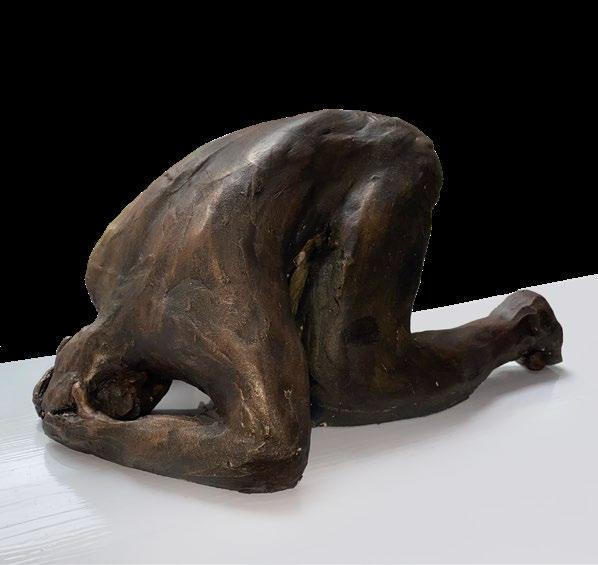LION PRINT 2024

Poetry and prose written and illustrated by Hampton School pupils



Poetry and prose written and illustrated by Hampton School pupils

We are delighted to present an array of imaginative content arising from our pupils’ enthusiastic engagement with the Writers’ Room, alongside contributions in response to stimuli provided in English lessons.
The accompanying illustrations - reflecting the themes ‘Structures’ and ‘Movement’ - have been crafted by pupils studying Art GCSE and A Level Art.
This publication is testament to the collaborative efforts of our English and Art departments; it offers an invaluable platform for Hamptonians’ creativity and individual expression.
We hope that you will enjoy Lion Print 2024.

Kevin Knibbs Headmaster
Please note, we have included written pieces from our senior Hamptonians from p33 onwards. These are for older readers.
David was an ordinary kid, in an ordinary house, on an ordinary street, but like all stories, there is always a twist...
An ear-piercing ring of the doorbell, a swing of a door and a brown sagging parcel. David had run downstairs in his pyjamas just to see what had broken him from his Saturday morning routine. A mystery box was slumped on the table. A pair of eyes were staring at it. David’s eyes. Questions churned in his head; what was this? Who sent this? Why did they send this?
The box looked ancient, sent from the past; it looked like it had survived wars, floods and storms. The tape, the only thing keeping the box together, was wet and on the brink of tearing apart. He could almost see the parcel slowly stretching. And then it burst. Shreds of wet brown cardboard was caked all over the kitchen and a long string of tape wrapped round David’s eyes. He tore it off and examined the room searching for anything that would have been in the manky box.
And there it was, a shiny clean orb. David picked it up and observed the specimen. It was gold, sparkling as the sun’s rays beamed on it. Despite the beaten-up box, this object looked brand knew. He ran his fingers over the spherical mystery. He could feel symbols etched into the metal ball. Without even thinking, he spun the ball round to see the carvings and what he saw was a triangle, a square and circle. What was this?
This wasn’t the normal Saturday morning David had been expecting; he was expecting a lovely time in bed with the TV controller in his hand. Breakfast on his lap, and on the screen hilarious comedy films. He sat at the table staring at the orb, contemplating what he should do with it.
A tremble. A shudder. A power cut.
David froze so still he was a statue. His heart pounded so fast it was a cheetah. His worries grew so much his head was a storm. This had never happened. This is what David hoped would never happen. He started to spin and feel dizzy.
It went dark.
He woke up not knowing what had happened. He woke up hoping nothing bad had happened. He woke up on a pile of bricks, where his house should have been. Where he used to live. Where he had memories of joy and tears. Now only one question lay in his mind, where was he?
He looked around to see miles of bricks polluting the area around him. There was a slim piece of paper blowing in the dusty breeze. It was newspaper, crumbled and stained. He caught it in mid-air. It read:
2050: The Day Nature Dies
By George Townley, First Year

In the heart of a bustling city, a prestigious art gallery stood as a beacon of culture and sophistication. The gallery was renowned for its priceless collection of rare artifacts and paintings, drawing art enthusiasts and collectors from around the world. However, one fateful night, the tranquillity of the gallery was shattered by a daring heist that left everyone baffled…
It was a moonless night when the theft occurred. The security system, successfully marked as state-of-theart, had been mysteriously disabled, allowing the thief to slip in undetected. The stolen piece was no ordinary artwork; it was the centrepiece of the gallery’s collection - a mesmerizing painting known as “The Enigma” by a reclusive artist whose identity was shrouded in secrecy. As news of the theft spread, whispers of conspiracy and betrayal filled the air. The gallery owner, a distinguished gentleman with a penchant for mystery novels, immediately called upon his trusted friend and renowned detective, Evelyn Blackwood, to unravel the enigma behind the heist.
Evelyn arrived at the gallery the next morning, her keen eyes scanning the scene for clues. The room where “The Enigma” once hung was eerily empty, save for a single red rose placed delicately on the floor. Intrigued by this cryptic symbol, Evelyn picked up the rose and examined it closely. Hidden within its petals was a tiny microfilm containing a series of cryptic numbers. Determined to crack the code, Evelyn enlisted the help of her tech-savvy
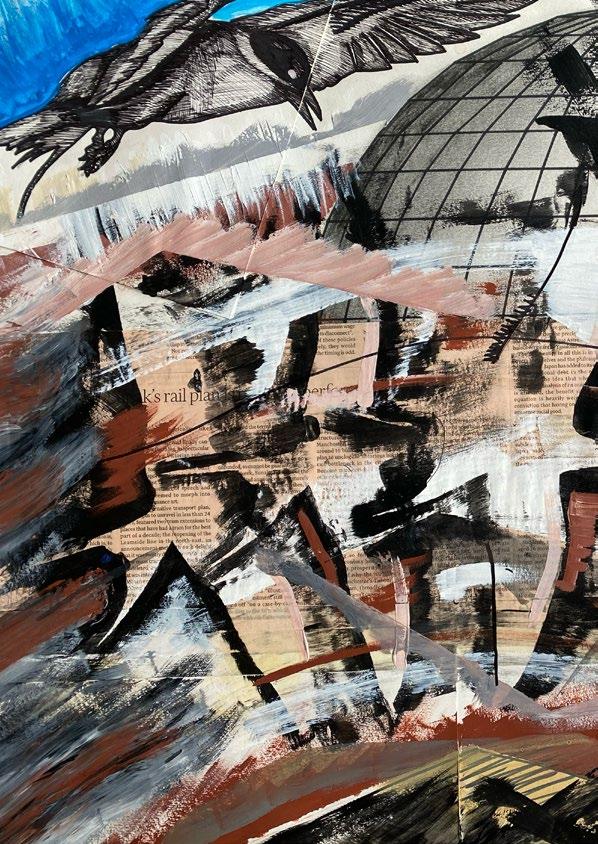
assistant, Alex. Together, they deciphered the numbers to reveal a set of coordinates leading to an abandoned warehouse on the outskirts of town. Sensing they were on the right track, Evelyn and Alex set out to investigate. Upon reaching the warehouse, they were greeted by an unexpected sight - “The Enigma” hung prominently on display in the dimly lit space. As they approached the painting, Evelyn noticed a faint inscription at the bottom corner that read: “The true mystery lies within.” Intrigued by these words, Evelyn studied the painting intently, searching for hidden clues or messages.
Instantaneously, they heard a sound, the sound of footsteps approaching the abandoned warehouse. “This must be the thief!” thought Evelyn, trying to remain calm, although she wasn’t good at it. As she scoured the site, she spotted a set of boxes, one just big enough to fit both of the mystery-solvers. “Perfect!” Evelyn concluded, urging Alex to join her and hide themselves from whoever the thief was. As the steps grew louder and heavier, the pair could feel their hearts in their mouth, their bodies were shaking, and they knew they could get caught.
As the mysterious man reached the painting, he could sense something wrong, as if he knew someone was inside the abandoned warehouse. The man called out, “I know you are here somewhere, and I promise I won’t touch you or your little partner there.” Knowing that she was defeated, she stepped out of the box and unwillingly, so did Alex. Evelyn was curious about this
man, supposedly the thief, and began interrogating him until he had spilled the beans. To Evelyn’s surprise, the mysterious figure answered all his questions, except the one mentioning his name. He had told Evelyn how he had stolen this painting because he wanted to discover the true meaning behind it.
“What meaning?” inquired Alex.
The man then replied to this question explaining how the artist who had painted the painting was his dad, but since he had passed away, he never got to find the secret message behind the painting.
“We will help you,” exclaimed Evelyn, “and we will make sure you find out that hidden meaning behind this masterpiece.” The pair resumed their search, now knowing what “The true mystery lies within.” was hinting at.
Suddenly, she noticed a subtle shift in perspective that revealed a hidden compartment behind the canvas. Inside, they found a meticulously crafted puzzle box with intricate engravings and mechanisms. With nimble fingers and sharp minds, Evelyn and Alex worked together to unlock the secrets of the puzzle box. As each piece fell into place, a compartment opened to reveal a small vial containing a mysterious liquid. Uncertain of its significance, Evelyn carefully examined the vial before noticing a faint aroma reminiscent of rare orchids.
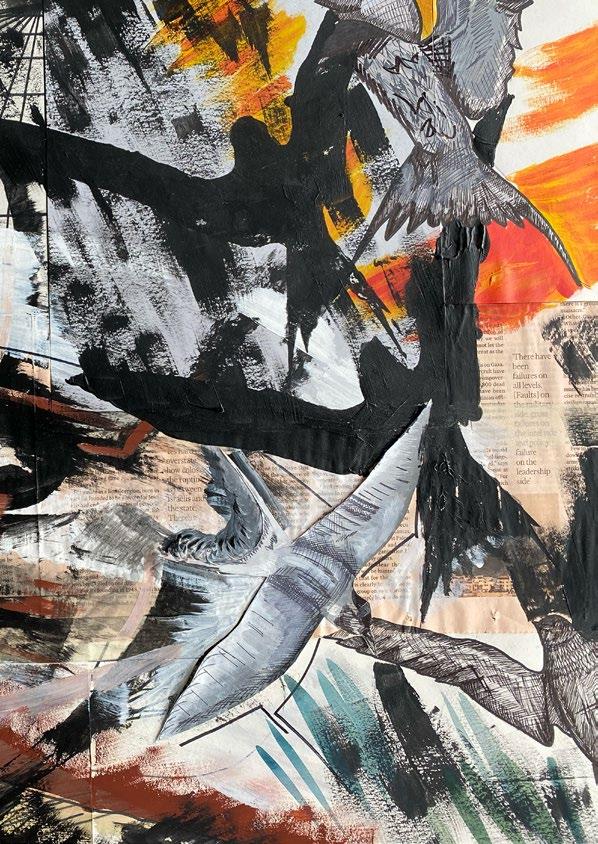
Realization dawned on Evelyn as she recalled an old legend about an elusive orchid known for its mystical properties. Could this liquid hold the key to unlocking “The Enigma”?
Without hesitation, Evelyn dipped her finger into the vial and traced a symbol on the painting’s surface. To their amazement, the painting began to shimmer and transform before their eyes, revealing hidden layers of intricate patterns and symbols. As they delved deeper into its mysteries, they uncovered a series of interconnected clues that led them on a journey through art history and ancient civilizations. In a thrilling race against time, Evelyn and Alex followed each clue to its conclusion, piecing together fragments of knowledge and wisdom from centuries past. Their quest culminated in a revelation that shook them to their core - “The Enigma” was not just a painting; it was a gateway to unlocking untold secrets and powers beyond imagination. As dawn broke over the city skyline, Evelyn stood before “The Enigma” once more, her eyes alight with newfound understanding.
The heist that had baffled so many was no longer just a crime; it was an invitation to explore realms of mystery and wonder beyond comprehension. And so, with “The Enigma” restored to its rightful place in the gallery, Evelyn Blackwood closed this chapter of her investigation with a sense of fulfilment and anticipation for the next mystifying adventure that awaited her…
By Naivedya Agarwal , First Year
A poem inspired by the sonnet style: a tribute to my grandfather.
Listening to his memories like a radio, as his long life unfurled.
Gradually turning into video, What a wonderful world…
He watched his past self nibble leftover breadcrust And become fully grown He had to do what he must But he was always alone
As he is taken back to the present he remembers his past struggles though now, they are distant. so he gives his grandchildren cuddles
And looks up at the sky, the clouds as they swirled and he thinks to himself, what a wonderful world.
By Ekam Randhawa, Second Year
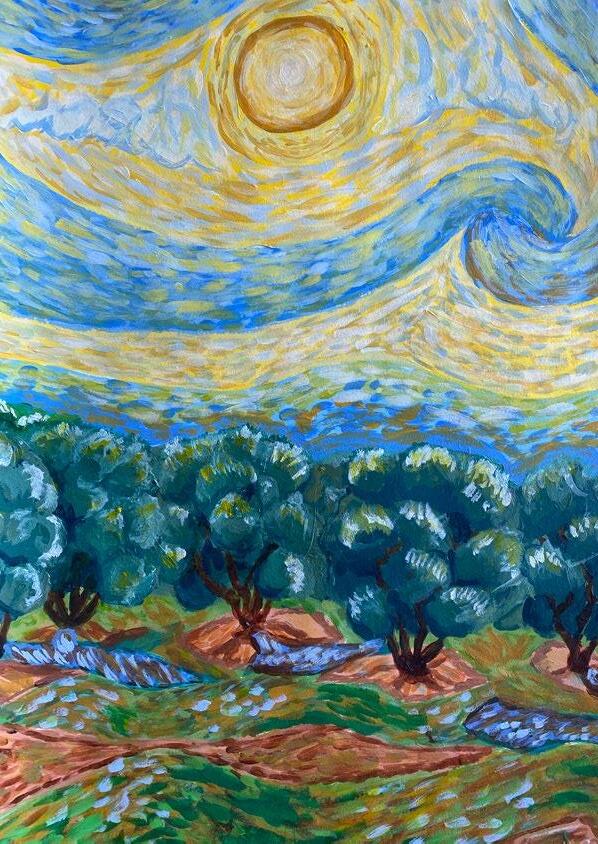
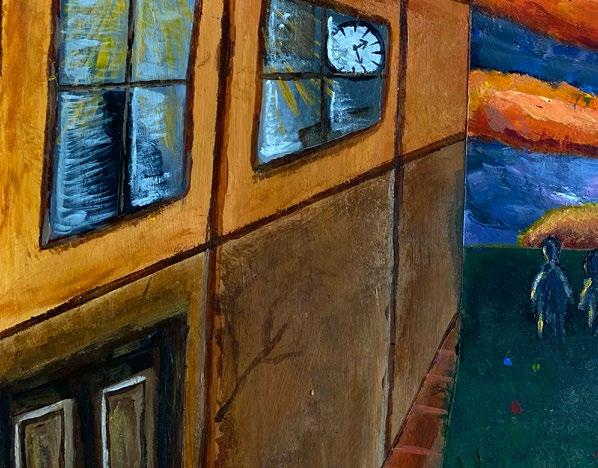
We had successfully landed on the millennium asteroid and were now ready to enter the dangerous chamber. I, along with the other mercenaries, were hired to take the relic and bring it back to our anonymous and mysterious employee.
The door emitted a low ‘Clunk-ashhh’ after the security chip successfully passed the Electrazoyde scanner. A wave of flashing crimson dust soon followed, and an atmosphere of malevolent energy covered us, and beyond the door we saw a seemingly infinite void which whispered to our sins and souls. Nevertheless, soon after I, along with the small mercenary army, entered. It was as if I was struck in the gaze of medusa, fixed in position, with the Hexaflash levitating and spinning. It was as if reality was glitching, the golden 3D hexagon randomly twisting and violently stretching, supported by thin air. The infamous Axelblade stone, Hyphane metal, Zeritoponane trailed after it like planets in a chaotic dance. Thankfully, before I was fully possessed, Zacian
acted swiftly and cast a low-level bindness spell to ward off the attraction to the artifact, one of the ways to cheat its defences.
I knew this would give us only a short respite, and that I had to encase it in my relic ‘Bag of frozen wind’ which freezes any inaminate object while leaving living hands unaffected. My strategy seemed flawless as the Voidgloom shields were up, so we slowly, carefully, continued. I successfully encased the Hexaflash, but success was not as assured as I had thought...
The corridors of the ancient structure twirled and twisted a pulsating blood-red, making progress difficult, though the relentless pursuit of survival drove us forward. Each step felt burdened by the loss and the looming threat of the unstable relic in my possession.
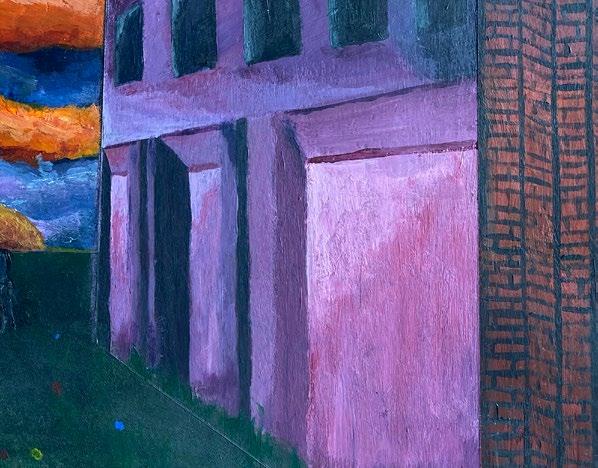
A deafening screech soon rocketed through the walls.
A blast of red laser cut through multiple rows of our group; I thought I was fine, of course, dozens of deaths is nothing to laugh at, but if I got hit, everyone would die due to the relic I was carrying. My brain went into overdrive, as I was met with the great revelation that this person crashing towards us was not Emily, or at least not the Emily I knew.
Her loving, innocent eyes were consumed by a red flashing hue, as the rows of sorcerers that still had magic in them awoke, staring unblinking, chasing us down. But even as we fought for our lives, a small voice in the back of my mind whispered a harsh truth: we were hopelessly outmatched. The power of the Hexaflash was too great, its influence spreading like a virus, corrupting everything it touched. I watched in horror as Emily unleashed another wave of destruction and I knew that our only hope for survival lay in finding a way to destroy the artifact once and for all. But with each passing moment, that hope dwindled, overshadowed by the overwhelming darkness that threatened to consume us all.
“There!” I shouted with a triumphant smile as I spotted the sleek black fighter, that saved me from many situations and hopefully would work right now. Zacian, searching for where my gaze went to, soon noticed the fighter, and gave a slight nod, all that she could’ve done as she evaded weapons being thrown at her. As we raced to the awaiting spacecraft, our holy grail, fatigue and desperation was all that fuelled our every move, the simple plan now a distant memory. The few that survived the first onslaught were constantly casting powerful spells to keep the hordes of possessed away, their morals now like an animal’s. But in a moment of hope, we reached our void-black spacecraft, then engines roared, the activation sequence started. The adrenaline and pursuit still on our minds, we raced to the back of the ship, away from our failure.
The Hexaflash slept, seeming innocent despite all the chaos it caused.
By Erik Plamadeala, First Year
The growling of the tracks underneath them made them shudder. The thick beads of sweat were blown off their masks and heads as the wind rushed past them. Then suddenly, darkness. They ducked so that their bodies were not ripped off their legs in the tunnel that they had found themselves in. Just as quickly as it came, it disappeared, leading into a massive chasm growing beneath them in a stretching canyon. Their leader signalled. It was time to strike. They opened their compartments as the train thudded in time with their hearts. Each of them dropped into a carriage filled to the brim with passengers. But they didn’t matter. The gold at the back of the train did. Each of them had to hold their compartments hostage so that the leader could finally throw off the gold into the river ahead. They needed to protect the gold, not steal it.
Everything was going according to plan. For now.
The leader had reached the back of the train and stared in awe at the towering pile of gold sitting right in front of him, as if it were holy. But he knew the plan. They were here to save the gold from the greedy hands of the Pinkertons. ‘We have time,’ he pondered, ‘why not take a few gold blocks?’ Just as he thought that, the door behind him cracked open as one of his informants on the train came in. With a pistol.
‘Sorry, old pal. They paid good money.’ he stated coldly while swiftly reaching into his holster, pulling out the pistol and finishing the leader. The leader kneeled, as if to beg for his life, and toppled out of the open door to his right into the chasm below while the train thudded on...
By Denis Shilov, First Year
Artwork: ‘Gold’
By Stefan Deverill (Upper Sixth)

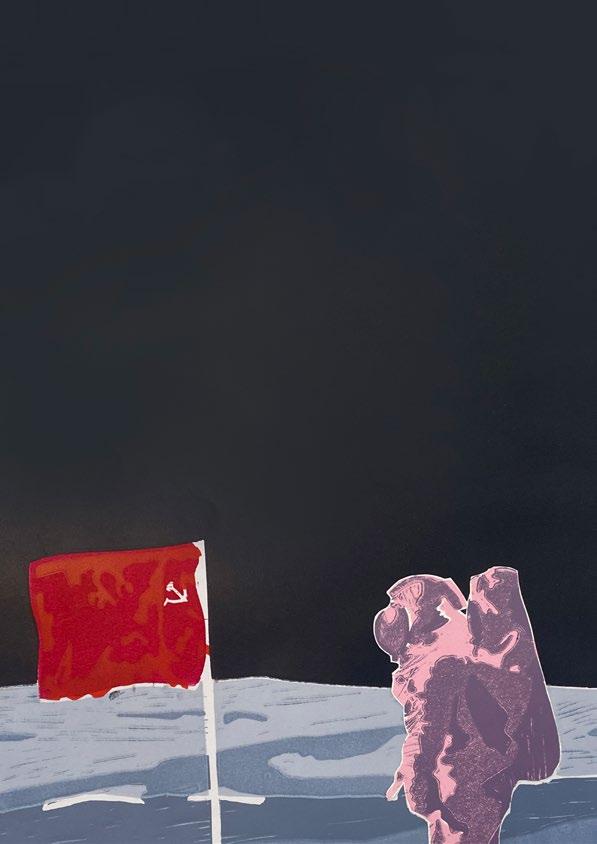
Artwork: ‘Planet
By Stefan
Deverill
(Upper Sixth)
Captain Jack Williams had always dreamed of exploring the unknown reaches of space. As an experienced space explorer, he had travelled to numerous planets and galaxies, but there was still one uncharted planet that had piqued his interest - Planet X7.
Located in a distant corner of the galaxy, Planet X7 was known for its mysterious and ever-changing landscapes. Rumours had spread among the space community about the incredible wonders that awaited those who dared to venture onto its surface. Determined to uncover the secrets of this enigmatic planet, Captain Williams assembled a team of skilled astronauts and set off on a mission to explore Planet X7.
As their spaceship approached the planet, Captain Williams couldn’t help but feel a sense of excitement and trepidation. The planet’s surface was shrouded in a thick mist, making it impossible to see what lay beneath. Undeterred, Captain Williams guided the spaceship down to the planet’s surface, determined to uncover its mysteries.
As they began to explore the planet, the team encountered a myriad of strange and wondrous creatures. From shimmering crystal-like beings to majestic flying creatures that soared through the sky, Planet X7 was a treasure trove of new and exotic life forms.
But as they delved deeper into the planet’s depths, they began to uncover a dark secret that had been hidden for centuries. Beneath the surface, they discovered a network of ancient ruins and mysterious artefacts that hinted at a long-forgotten civilization.
As Captain Williams and his team pieced together the clues, they realized that Planet X7 was not just a planet - it was a living, breathing entity that held the key to unlocking the secrets of the universe. With this newfound knowledge, Captain Williams and his team knew that their mission was far from over.
And so, they continued to explore the wonders of Planet X7, uncovering its secrets and unlocking the mysteries of the universe. As they prepared to set off on their next adventure, Captain Williams knew that the journey had only just begun, and that the wonders of the cosmos would always beckon to those who dared to explore the unknown.
As the team stepped out onto the planet, they were greeted by a surreal and breathtaking sight. The landscape was a dazzling display of vibrant colours and strange rock formations, unlike anything they had ever seen before. The air was filled with strange, otherworldly sounds that echoed through the canyons and valleys. By Amaad Bilal, First Year
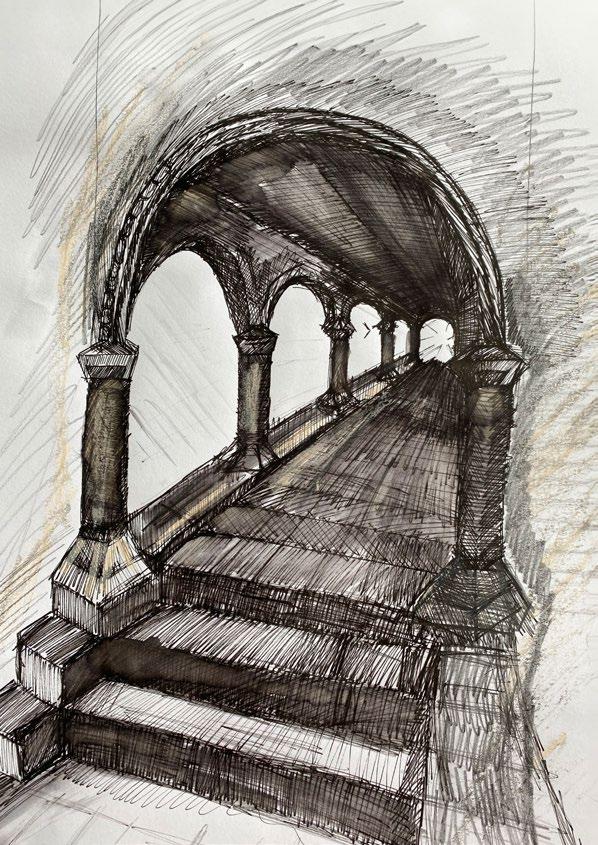
Artwork: ‘Hiding’
By Thomas Tatnall-Schreve (Fifth Year)
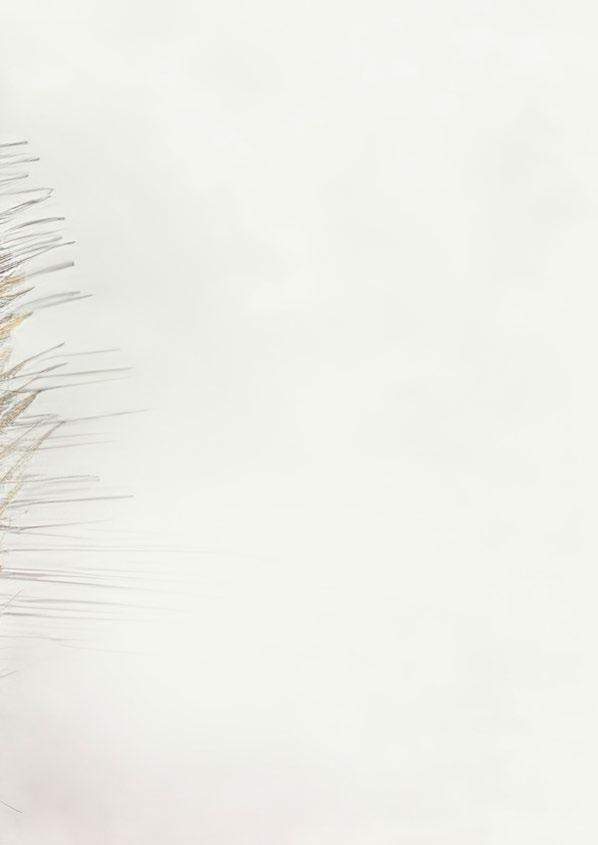
As the streetlights loom over, My heart sinks lower. The buildings around me laugh, Taunting me…
Mocking me…
My head spirals round and round. My feet feel glued to the ground. I want to run; I want to be free. But they won’t let me…
The search lights come closer and closer, Once they find you it is all over.
So, I must hide forever and ever. There is no point trying to be clever.
Oh, when will I be brought to light?
Must I continue this ruthless fight?
A land where darkness rules supreme, And we all fall into their scheme.
I hear the captured. Their shouts, their cries of sorrow, As they dream of a better tomorrow.
They said that they will make a change. A better world they said. We all believed them. How naïve we were. We listened in awe. But nobody saw. That it was all just a trap, They were crocodiles waiting to snap.
Now we wait for freedom. We helplessly pray.
“Please let me be free.”
By Kavith Thayaparan, First Year
The trees swayed as the wind whistled through the deep woods, echoing, and resonating like an out of tune flute. Unexpectedly, a silence. A piercing silence, that came before the storm. The sky, and the world became monochrome. The clouds greyed and there was no light. The sun had disappeared, it had been deprived of all light, and devoured by the ever-hungry clouds. There probably was no escape from the storm now.
I woke up to the sight of my clock; bright letters it shone 01:07. It must be that same dream that wakes me every day. Then I noticed it. The distant roar of thunder. The storm had come for its revenge. I could only watch, as the clouds turned the sky into an oil slick of colour, the clouds swirling in the night sky. It looked like a miniature Milky Way galaxy was forming not so far from my residence.
Without warning, a small clump of cloud, about seven feet wide shot towards my bedroom, at first only a mere speck in the forlorn horizon, forming into a ghostly shape, arms appearing from each side. I panicked like never before. I had to improvise. Clouds are not solids. They will not be stopped by objects in their way! Water, I needed water. I grabbed the garden hose from the open window ledge and watched as the water gurgled out from the tap into the tube and hit the cloud. The cloud writhed around, hissed, and cursed like a snake that was being barbequed alive. Finally, it broke into nothing more than mist and fog, and whispered, we have found
you. We know where you live. We will not fail again. And put the last of its efforts into soaking me in its wet spray. I choked and felt breathless and miserable after that experience. I leaned down onto the bed in the moonlight, still half choking, gasping for air. 01:19.
After vigorously wiping myself down with a small orange towel, I thought my tactics over. Thoughts rattled around impatiently in my head, like coppers being shaken in a piggybank. I could not tell my family. They would mock me. They only know clouds as the soft white forgiving ones in the day. No one else knows The Night Clouds. There was no telling where they would strike next, but I had to be ready for them, I had to be ready at 01:07.

I have finished school today. After a long interrogation process with my mother, discussing why the whole bedroom was soggy and smelt of earth, I returned to my watch post, peering out of my boring, white- rimmed, double-glazed windows. This seemed like a treacherous position. I looked at the sky for the entire day, and the dark clouds have not receded. I am not surprised; I don’t know what I was expecting. After I meticulously made sure my parents would not see or hear me, I made sure they were sleeping, and I picked the door lock the other way with one of my mother’s fancy, pink hairpins. They were locked in now. I tiptoed throughout the house, past the fireplace, and into the patio. I wore my favourite
wellingtons and set out to my father’s garage. After some quiet but labour-intensive tinkering and scurrying around among the different utensils, I pulled out the game changer. The pressure washer. I stood out on the patio with this formidable weapon and stood boldly and defiantly. I imagined I looked like a ghostbuster, with the boots and the pressure washer, only spraying dangerous clouds, instead of quirky ghosts. I was ready. After about half-an-hour later, I heard a whistling noise, followed by large low rumble.
The Night Clouds were roaring at me, trying to intimidate me and stop me from making my move. An abundance of small clouds swirled together and cloned each other into one monster cloud, which descended to earth, which was about seventy feet wide, came down low to the window of my bedroom trying to sneak up on me in my bed. It blotted out the moon, causing me to be stranded with almost no visibility. I pulled out the pressure washer, however the cloud saw me, and I was not quick enough, a small blob was watching my every move. I pulled up the power button and pushed. Nothing. I pushed again. No
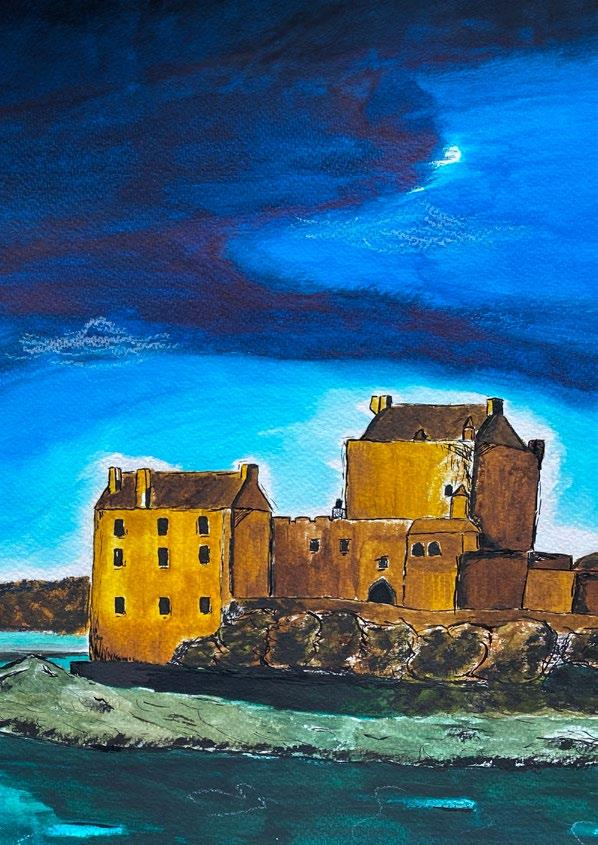
response. In the horrible moment, I realised the button was rusted, and it was jammed. I pressed vigorously, repeatedly, but the water would not come out. I pressed with all my heart and soul, and the button finally yielded. At first no more than a trickle came out of the nozzle. But in an instant, a powerful stream of water spewed out, and the jet fast stream of water hit the cloud. So much water came out, I drained the ocean. It was a direct hit, and the cloud groaned, and split into may smaller clouds. It writhed and screamed, and the cloud disintegrated with a giant explosion which sent water flooding the whole back garden (My dad would be very pleased about that) and disappeared. My breath became short, and I crumpled onto the floor, and almost closed my eyes. I had done it. Artwork: ‘The Night Clouds’
By Alexander Bubb, First Year


‘What have I become?’ Another ragged thought lodged into my head. I shook it out. A powerful gang leader cannot afford to regret, to feel remorse. I must be ruthless. But you never meant to be a gang leader, you were meant to be an equality loving – . Aargh, stop it – this...this…animal was taking hold in the back of my mind. I had to stand up for what I believed in. Equality. With each person getting equal things, and a representative voted by each region to stand up in government, everyone would be equal. No unfair dictators, no mistreated slaves. With everybody equal, nobody would need to steal, or kill, or do anything violent. But was that what I was doing? I was killing, I was stealing, I was exploiting any means necessary to succeed. Was that equality?
Again, I pushed those thoughts away. I wasn’t going to be stopped in my cause. My biggest raid was coming tomorrow, and I had to be ready. Tomorrow was the day where we would overthrow the dictatorship of Thomas Artino – the Shadowborn. Tomorrow was the day when we would find peace. Tomorrow was the day when we would show the world who we were. I went to bed troubled that night, and only fell into an unsettled sleep when I thought about the peace that was about to be gained– the end to this rebellion, when there would be no more killing.
In the morning, I got up and half-heartedly performed my rallying speech for our formidable forces, and we set off. Artino was set to make a public speech at the main square today and we would ambush the stage and kill the Shadowborn. A simple plan, but a good one. He would have a team of ten guards, but with our team of twenty-five, that wasn’t a threat. The team that was going waited nervously in the lobby of our hijacked hotel, located in the suburbs of London. When it was time, nobody spoke, just filed out onto the street in silence. I lagged behind, trying to silence the battle in my head. If everything went to plan today, there would be eleven deaths. I’d never meant to be a terrorist.
Once in the crowd, we inconspicuously weaved our way through the mobs of brainwashed fans, moving in small groups so as to not attract attention. At the back entrance to the stage, five guards sat on plastic chairs, picking their noses, and generally looking uninterested. But despite their unthreatening looks, they all had a submachine gun sitting next to them. I didn’t want to take chances. Artino carried on, unfazed by the gunshots that
had just ricocheted around the square. We continued. We continued through backstage, and something was wrong. There were no guards, no people, no sign that someone had ever been here. And I was still having the battle – no – war in my head. I wasn’t sure I would be able to kill Artino when the moment came.
Our team rampaged through the backstage hallways; it went from gunshot to hit over the head with a hammer to stab with their own knife. I couldn’t handle the blood and gore much longer. Sure, I had organised many similar deaths, but I’d never actually committed murder.
Finally, just when I thought I was about to vomit, we reached the door to the stage. I pulled out my knife, but it had never felt heavier in my hands. Artino was out there without protection. But was I strong enough to kill him? With words of encouragement from my peers, I put those thoughts to the back of my mind, though I was sure they would re-emerge later at the crucial moment. Bursting through the door, I brandished my knife and walked slowly up to Artino, who carried on with his lecture despite many gasps from the already riotous crowd.
Without me even thinking, my knife was at his throat, and I was screaming, “What is this act you’re putting on, Artino? You expect people to let you be leader without a vote, without a democracy! You expect people to fight for you, die for you in the wars that you create!” But as I said it, I stuttered. Why was I doing this? This could not be the best way to get a democracy.
Artino pressed his advantage. “And there was democracy in your gang? Your people voted for you? There was equality?” And suddenly, I couldn’t stand it. My knife lowered from his throat, and I collapsed on the floor.
“I still believe in equality, but this is not the way to enforce it.” I said, almost begging now to be forgiven. “All I ask is that we have a vote. Just a vote, every five years, to decide who leads our beautiful country. Democracy for our people!”
The crowd cheered with me. I went from begging on the floor, to standing and cheering. Artino was forced to give in. I had redeemed myself. I had won!
By Magnus Findlay, First Year


Artwork: ‘The Funeral’ By Daniel Kim (Fifth Year)
The rain hammered down, like a snake spitting venom, onto the mass crowds of people in black dress and black suits. It felt like death in nature, darkness crowding the sky like an ominous uninvited mass throwing and hurling the repetitive lashings of rain, which poured onto the grey, gum-splattered dismal pavements of the city, the breeding ground of sickness, disease, and poor living conditions. A mumbling beggar began crying loudly about the end of the world and misery like a doom-bringing soothsayer. His clothes were rags and his paper-coloured skin shivered in the rain as his unfed dying body turned and writhed while the storm brutally raged above him.
The people watched the coffin in silence as rainwater fell, dripped, and pooled onto the gravelly pavement. A solemn priest holding a sodden Bible spoke slowly and precisely but uncaringly as if this was a chore, rather than a duty. An elderly man, who looked like he should not be exposed to the harsh elements. He sobbed to himself quietly as the rain, drowned them with its miserable cold shots that soaked them like blood from the guilty man’s knife.
‘Ashes to ashes, dust to dust; in sure and certain hope of Resurrection to eternal life.’
The silence continued as they lowered the coffin into the muddy rotting soil. Two young gravediggers began heaving soil as her body was getting hidden, suffocated until all there was to see was soil and silent people. They began walking away, in clusters of threes and fours not speaking still until there was only the old man left, standing rigidly and unmoving as the clouds continually unleashed spats onto his weak frame. He stood there for many an hour.
As the slips and gashes of dawn began to creep into the black soaked sky, he began to cry a soft, childish cry as he sat next to the grave, hoping this could all be a dream and life wouldn’t have taken this abrupt turn.
He was the only one who cared for her. He was the only one who sought any sort of happiness from her dismal life. She was the only thing in his life who mattered to him. And now she was gone.
By Teddy Abell, First Year
Stars, The spirits of the lost ones, I stare at them,
Even in the foggiest night, The veil of darkness consumes me, Hugs me like you did,
Stars,
They glimmer with passion, Just like the sequins on that dress, My favourite dress, Stars,
They appear at night, When I sleep, While I weep,
While I long for you to come back, To wish me good night,
Where are you now? Where?
Lost,
But you shine bright, You shine bright in my heart, Just like those stars do,
I still call out, I still call out, “Mum!”
But there is no one, Just stares from the other ones, The other orphans,
Dad was different, An unheard whisper, I never saw him, Any of him,
Mum, You said you buried nothing, The grenade took him away, It doesn’t matter what you bury, Those who are lost are buried in the heart, I believe,
I am made to believe, That dad died on service, For not one life, But for many,
The tears, They soothe nothing, The stars, They soothe nothing, But they remind me, They remind me of who I am, My purpose in life,
To be the one my parents would have wanted me to be,
But what do they see, They see nothing, Their light has not shone yet, But mine will, For them, If it was for anyone.
By Ethan Sharma-Wadeson, First Year

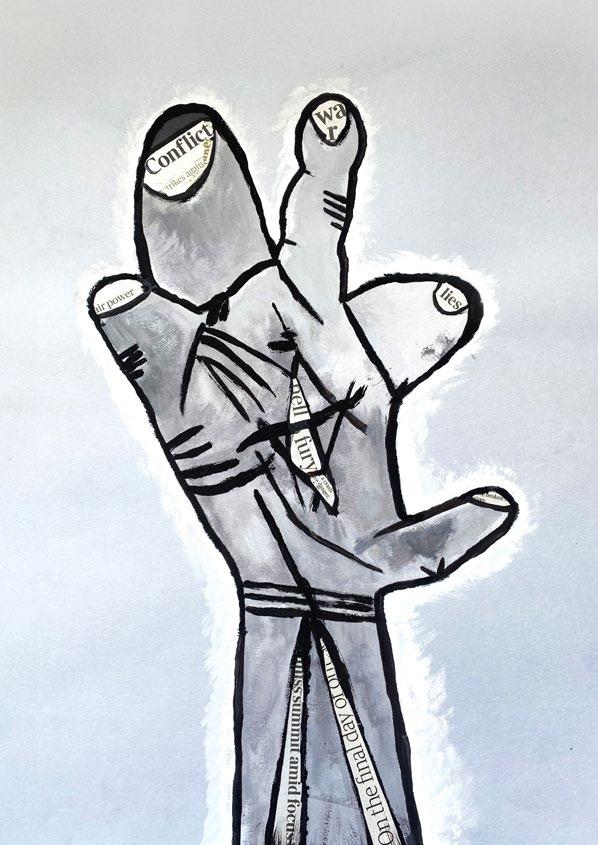
By Lorenzo Ingrassia (Third Year)
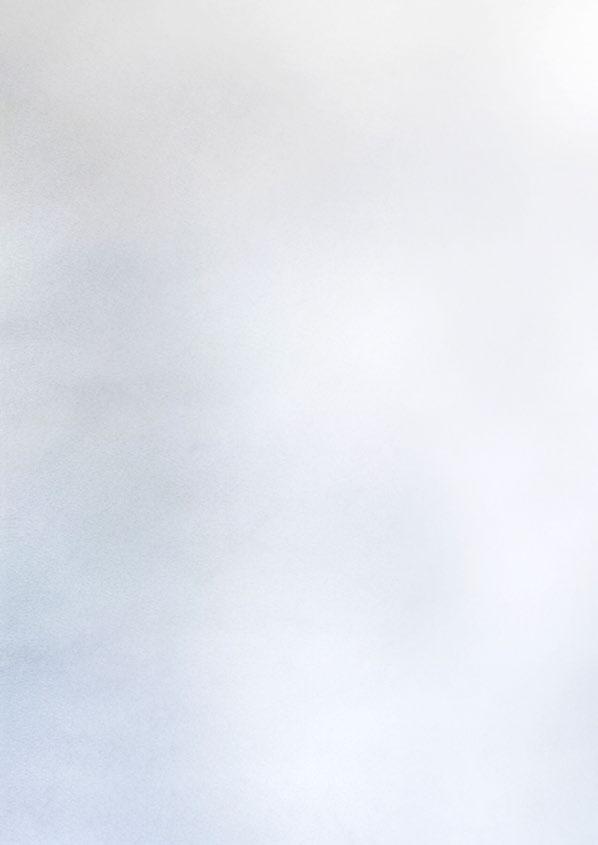
Drawing on R.C. Sherriff’s play, ‘Journey’s End,’ I envisioned crafting a letter from Raleigh, one of its central characters, to his sister Madge. Ravaged by the aftermath of a raid, Raleigh finds himself grappling with horror and some haunting questions.
Dear Madge,
I’m alive. I don’t deserve to be alive, but I am. This morning Osborne and I, along with ten others, were sent to raid a German trench. In pure daylight. With German machine guns trained at the opening. We were sent to die. By some sort of miracle, the raid succeeded. Anyway, none of that matters. Seven kind, strong, brave men died today and Osborne one of them. By God, Osborne. He should be alive. He should be here instead of me, telling stories to the soldiers, brightening everyone’s day, going home to his family. Why did he have to die? Why did he have to wait for me? If only I wasn’t so slow. I must warn you that I’ve changed, Madge. I’m not the same schoolboy you used to know. I have blood on my hands. Whether it’s mine or Osborne’s or any of the other men, I shall never be able to wash it off.
The mood in the trench has changed dramatically. Dennis will no longer talk to me and Hibbert now just sits on his bed blocking out anyone that tries to talk to him. The loss of Osborne has undoubtedly changed us all. The evening is the worst time of the day. We sit in silence eating our food. To make matters worse, I feel as if my previous friendship with Dennis has been destroyed. I think that he wishes that it was him on the raid instead of me. Then he could have saved Osborne.
War really is different from my expectations. Of course, I knew the risks, but this, this is something else. This is a freak show. I went on that raid excited and childish, like a fool. If only I knew. It was as if I was a lamb being sent to the slaughter. I had no clue in the world that anyone would die. I realise now that this isn’t a fairytale. No one gets to live happily ever after. I suppose I now see why Osborne read those children’s books. Anyway, it doesn’t matter anymore. Osborne is dead and there is only one person that I blame more than myself: the colonel. He knew that people would die. In fact, I think he thought that we’d all die. There’s no person I hate more in the world. He sits in his ivory tower sending men to their deaths. Men with families. He has no idea how much harm he causes. You know, he said he’d give me an MC. You’ll most likely see me in the paper. I should be excited, and I was before the raid. However, now, I just don’t see point. Why be a hero if you can’t save the ones you care about?
I hope all is well back home. I wish to be back soon. Tell mother and father that I love them. I can’t wait to see you all.
Love, Jimmy Raleigh
By Willoughby Ewing, Second Year
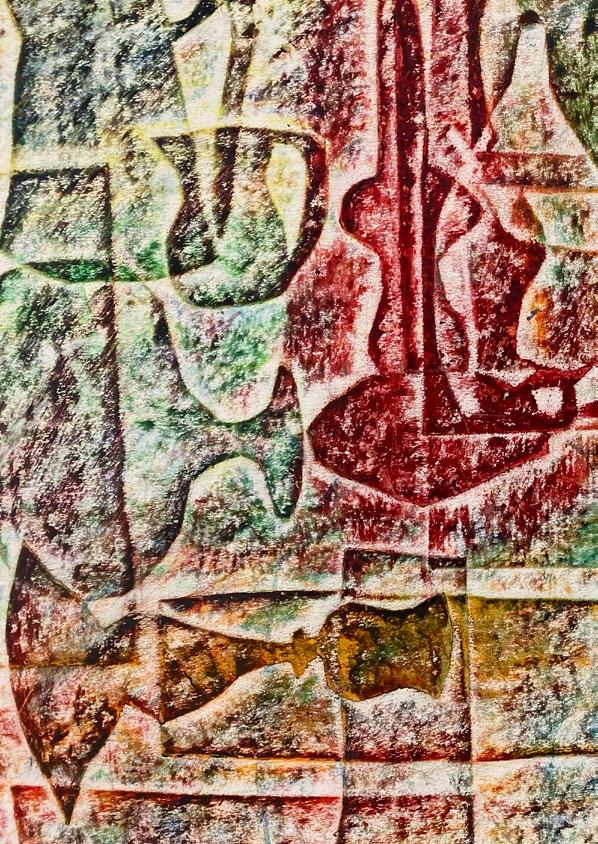
The snow fell hard, and the wind blew strong outside. Sharp icicles hung like daggers from the overhang of the window. Inside, deep armchairs and small side tables, topped with an assortment of drinks, sat around the large room. An array of books lined the shelves all around the walls. A large fire burned gently in a huge fireplace, surrounded by a ring of low chairs. Four young men dressed in dark tuxedos sat in the chairs with small glasses filled with gin clutched in their hands. They were muttering in gruff voices to themselves when a large man, holding his own filled glass, entered. Striding towards the fireplace, he then leant against the bookshelf. He adjusted his rimless glasses around his bridged nose. The four brothers stopped talking and watched him. He closed his eyes and said elegantly, but quietly, “Is it done yet?”
The others seemed shocked at this question and said nothing. He repeated, “Is it done yet?” His quiet words cut through the air like a bullet.
The fire flickered gently. The room filled with tension. The oldest of the brothers, whose name was Arthur, fidgeted and uttered, “We need more time…if you could just give us a day…just 24 hours,”
The older man in the corner suddenly stepped closer to the men, slammed his glass down on the silver table. “No!” he yelled, “No, no, no! I gave you a deadline!” Another of the young men in the armchairs, Oliver, opened his mouth but the older man cut him off. He smashed the glass off the table and began furiously pacing in front of the fireplace. “I want it done by midnight tomorrow!” With this final remark, he changed direction and stormed out of the room.
In the older man’s absence, Arthur rose from his armchair and poured himself another glass from the crystal decanter. He turned towards the others who were waiting for instructions and announced, “We better get to it then, shouldn’t we?”
The snow had stopped falling now but it had left a thick blanket over the lawn and trees. The dawning sun rose over the horizon with a golden hue. The icicles on the overhang began to fall to the ground. One by one they fell, impaling the snow like murderous daggers.
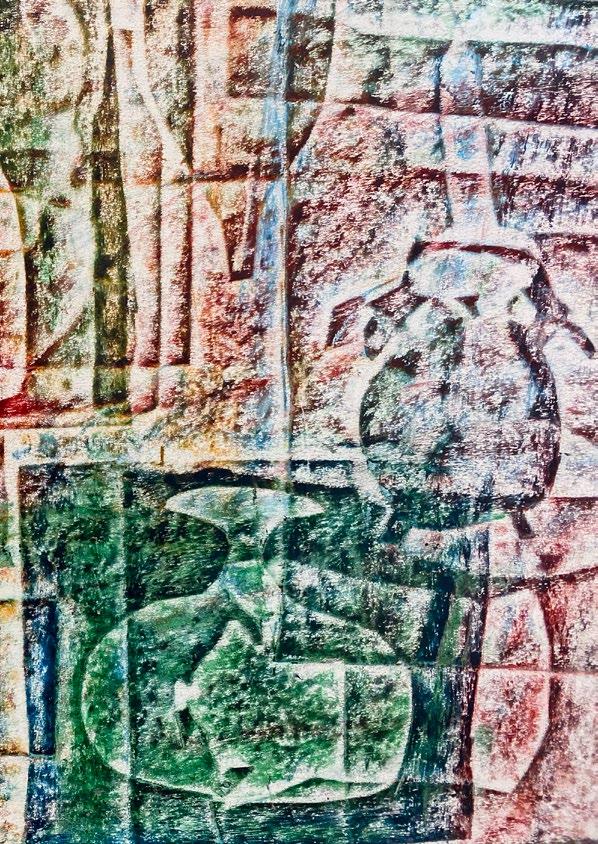
By Marcus Panditharatna, Second Year
I wonder what the sky tastes like. The morning sky is a soupy concoction of froth and fluff and cauliflower patches, glistening with the eggy blood spilled from the sun, swimming in a turquoise bowl. Birds, like pepper, dot the sky as they flutter along their perpetual pilgrimage, their destination lost in their journey. An airy mist dances in the valleys, choreographed by the planet’s gentle breath, before the day heats up and burns it all away.
Florence, from up here, is a beautifully uneven array of crimson tiles, shattered into hundreds of homes, dwellings, and churches. Cobblestone alleyways wind their way among the rooftops, like stone-cold blood vessels in some dormant creature. In my mind, those vessels really do carry Florence’s blood, as age-old traditions, and trade flow through its veins, radiating life and culture.
The mountainous outskirts of the city are where the other half of Tuscan culture lies. Rolling green hills, made of olive trees and built on tradition, make up the landscape. The odd hut pierces the verdant view, usually a farmer’s residence, and sometimes an olive press. Back here, in the fields surrounding the tower, we have our own olive grove. Every year, in the picking season, we go and hand-pick each olive and let them drop onto nets we’ve used for generations. After tipping the contents of the nets into massive wooden crates, we take them by cart to our local press. This is my favourite part - the cogs and wheels and machinery, all operated by hand. Each of the parts working for one purpose and one purpose only, and if one of them failed, nothing would work. It is an ingeniously complex marvel of engineering.
It is that machine, and the wonders of nature in innovation, that planted a seed in my mind - a seed that I’m sure will stick with me for life. That seed is already growing in my brain, sprouting its vivid roots of creativity - and its fruits have become physical. Down in the cantina, deep below the tower’s courtyard, I have been working on my most complex, adventurous, and wonderfully absurd project yet - a flying machine. It is made to represent nature’s ingenuity, to replicate a bird - specifically an upupa, a uniquely crested bird that resides in one of the tower’s arrow-slits. These birds have been supernaturally encoded for flight, and my plan has been to replicate that design with my creation, using wood and silk. And finally, after a year of glue and wood and sweat and toil, the main frame is complete. All that remains now is to install the membrane and implement the mechanisms.
I hop off my windowsill, my bare feet making contact with the rough wooden flooring and my mind frantically vibrating with joyous anticipation. Today would be the day I’d finish the entire project, and I could prove to the world that nature held all the answers. I bound down the flights of stairs, the odd slit in the thick stone walls letting the sun fall inside as a sharp beam of orange. I race excitedly out onto the courtyard, and then down the final steps to the Cantina door. As I open it, its wise, wooden smell evoking a host of memories. It is the door I have opened every day, rain or shine. It is the door I have opened to reveal the work I love, and it is the final barrier to unleash the innovative glow of the flying machine.
I step inside, walk over to the silk, and begin lacing it between the slats of wood on the wings, stitching it up when the piece runs out. For the entire afternoon, all that fills my mind is silk and stitching, the scent of glue and silk hanging in the air.
By the time I stitch the final round of silk, it is evening. Anticipation flutters about in my stomach, coaxing me to end this journey. It is really happening. It feels as if my machine has been building itself a personality, coming alive, and beckoning me to flight. It is calling me to swim in the sky among the Upupas, and I daren’t refuse.
Now it is all ready. I fold up the wings and open the double doors from the Cantina. It barely makes it through, and after pulling it up the stairs with its wheels, I drag it to the field, my heart threatening to thump out of my chest. I chose this field as it was clear, and gently sloping down towards the city beyond.
I line up years of effort on to the field and unfold the wings.
The horizon is glowing, like a fire encapsulating the earth. The sun is sinking into it, and as it melts into the night, it suddenly becomes my life. This could all fail. Are these my last moments? My very existence is melting into the horizon, sinking into the night, where it could cease to exist. I could die tonight; my duty here is done.
Tentatively, with my stomach wrung tight like a muslin cloth, I enter my machine. My hands and feet find their way to the controls. I flap, and flap, and use all that remains of my might to power the initial lift. I feel the whole structure gently rise off the ground, and with my mind frozen in wonder, I cannot tell if I am about to leave home forever or return to where I belonged.
By Sam Field, Third Year
By Sasha Garkavenko (Fifth Year)
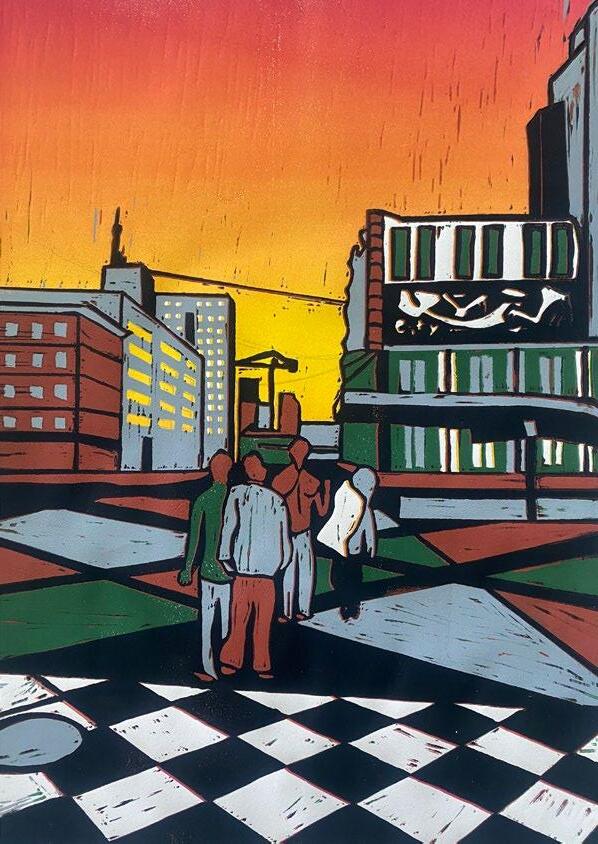
Your name was Nāder. You probably don’t remember, having spent so long in here, but I do. I’ve always known who you are, even if you didn’t. We haven’t got long, so I’ll explain as I go…
It began with a voice, echoing through the night. The wind rustled the trees, knocking loose the brittle leaves. Autumn was well on its way, leaving the trees bare and the air chilled.
It began in a cottage, nestled within the dying forest. The warmth of the lanterns kept the cold at bay, but they could not ward off what was coming for you.
“Find me.”
The whisper crept through the windows and wrapped itself around your mind. You tossed and turned in your sleep, asking where to find them. But no more came.
You tried to forget about it, saying it was all just a dream. But dreams had not remained like this, never before. Something had reached out, called for you, and simply left a sinking feeling in the pit of your stomach.
Two nights passed, but the thought lingered. Not even the comfort of sleep released you from your turmoil. You tried sitting in the darkness, tried to say it’d end, but nothing helped – it only worsened. Everywhere you went, everything you did, it was there in the back of your mind, delving deeper and deeper.
Then the fires came. A flash of lightning raced over the forest; the crack of thunder closely followed, but the flames spread deliberately. Trees blackened, the ground charred, and the inferno drew closer.
Three hours was all it took. You hadn’t noticed the blaze creeping up until it was too late, the flames licking at the walls. Awakening suddenly, you leapt out of bed and into the woods, watching as your world collapsed around you. And as the last pieces of your life turned to ash and dust, that little thought kept you company.
You had no place to call home, destined to drift despondently until you too crumbled into nothingness. And so, as a new rain poured upon the ruins, you wandered into the darkness.
And all throughout, those words echoed within your mind. It was much louder now and continued to grow in volume as it bounced within your skull. Lost in your thoughts, the one thought, you lost all sense of time. Nothing else mattered, had meaning. You ran, and ran, and…
… tumbled into the abyss, plummeting into the depths of the darkness. The light, once filling your vision, shrank to the size of a ball, then to a pin, then nothing. Only the infinite void remained.
Eventually, your descent slowed, and you rolled to a stop at the edge of a chasm. One false move, one gust of wind, and you’d have continued falling, falling, falling. And maybe, hopefully, splat. At least you’d stave off starvation for any rats that had made it down that far.
But there was something else, someone else. You scanned around the cavern and found them.
They weren’t so much a person as a presence. An overwhelming sense of darkness poured from where they stood, absorbing any trace of light. Something smokelike emanated from their body, withering any attempts at life. But within the void were two points of yellowed light, tracking you as you rose.
“Oh, hello. I’ve been expecting you,” The Shadow said. Well, seemed to say, though the voice just appeared.
“Where… where am I?” You stuttered, shaken with fear.
“This?” they replied, “this is my humble abode! It’s a touch on the bare side, but it serves its purpose.” They began to pace around the chamber, staring at the blank walls as though they were pondering what to fill it with.
“You may have noticed it’s quite a way away from the surface. I don’t like it when insignificant beings tumble down here unannounced.” They turned to a stack of bones in the corner, scowling, if that was even possible.
Artwork: ‘Lost Within’ By Marin Matejka (Fifth Year)

But you didn’t notice, too scared to move. “Oh, push over. I’m not going to kill you! You’re much too important to me…”
Confused, you mustered up the courage to ask, “Me? Important?”
“Yes,” they drawled, “you have something I want. And I’m willing to offer quite a bit for it.” They ambled over to the chasm and, to your surprise, continued over as if it weren’t even there. “As you can likely tell, I don’t have much substance at the moment. And there was just something about the others that didn’t quite fit,” they chuckled, “no pun intended.”
“You want to take my body? There is no way I’m going to let that happen,” you declared. “I don’t need whatever it is you have.”
A cold chill ran down your spine as the shadow tittered. “You’re quite the joker, aren’t you? No, no, you can’t refuse what I have to offer.” They paced around you, tutting as they went. “You know that feeling you have when something just isn’t there? That sinking feeling at the bottom of your stomach? Well, and hear me out, I have what you’re missing.”
“And what’s that?”
“It’s almost ironic. I can’t believe you’ve forgotten your memories.”
“Memories? Sure buddy, I forgot my memories…” As you spoke, the realisation struck home. You had forgotten something – a lot of somethings. How did you get to living alone in the forest? You had no recollection of how it had all begun, as though it were…
“… the start of a dream?” The Shadow finished, “I suppose it is. Now, I don’t have long, so do hurry.”
You had come to the crossroads. Here, you would define what was to be of the world, whether you realised it or not. All the roads were dark, but you stepped into the waters, sinking down into the void.
You’ve never really been alone, despite everything. We’ve been up here every step of the way. He was never meant to take control. It was always meant to be you. But my words won’t change what has happened.
And what has happened is beyond words.
By Ryan McAleese, Lower Sixth
The spark for ‘Quick Writes’ ignited within the Junior Writers’ group, fuelled by a desire to craft brief yet vivid vignettes and descriptions around randomly chosen themes. In this instance, the catalyst for the creation of these two pieces was ‘nature.’
As the sun began to set, they grabbed each other. As they sat cuddled up on the beach waves gently clutched their legs. Their laughter ran around the air. The sun slowly descended below the crystal-clear waves. As the stars gathered around the two, they looked up. A shooting star ran across the beautiful sight. Together they made a wish. Fortune, gifts, and happiness: they wished for these things, but little did they know that would be their demise. Suddenly the star smashed into the water. Waves crashed around and threw themselves onto the two. The waves left him alone, but they took her. She screamed for his name. He screamed. She was gone. No one could find her. Every day, he cried in despair.
Suddenly, he came back to reality. The rain hit him like bullets. He was ashamed but not defeated; he knew she was out there, somewhere... First, he knew he had to remove her grave. He couldn’t stand the thought of her being dead.
As he stood in the rain, the sky turned black it was like a hole where, no matter what you did, you could not get out. With his shovel he struck the grave. The rain hit the floor like bullets, the wind howled like as lonely wolf.
A ghostly chorus ran around the graveyard sending a consistent wave of shivers down his spine. But he didn’t let that stop him. He struck the grave; he was there all night, as the first few rays of sunlight broke free from the clouds. People would soon be there. He knew what would happen if he was caught.
By Leonardo Pereira Xavier, First Year
As I waded through the thick flora, the tranquil sound of rushing water got closer and closer, while my feet brushed along the shrubbery of the forest floor. The whispers of the exotic trees surrounded me as I continued through the lush woodland. The verdant layer of shrubs was interrupted by a narrow, muddy path. I followed the path to find an alluring waterfall, surrounded by moss-topped rocks and flooded with golden rays of sunshine, reaching down as if to be lured in by the
stunning beauty of the forest. Fearless gibbons swung from the heights of the canopy as the vibrant birds looked down on them. I didn’t know why I was there, or how I was there, all I knew was that I didn’t want to leave. The breathtaking fauna and flora, the welcoming nature and tranquillity of the waterfalls, made it impossible to even think about leaving. As I laid down on my back, I stared into space, smiling as I knew I would finally be happy forever.
By Leonardo Pereira Xavier, First Year
Inspired by the study of Shakespeare’s ‘The Merchant of Venice’ this piece explores the emotions felt by Antonio as he awaited the conclusion of his deadly bond with Shylock. Artwork: ‘Lost Within’
The Jew had had his way, judgement had been passed. His life, thrown away with the strike of a gavel. Time passed by him for the last time. He would see the light no more, just the darkness of death, the endless darkness of death. His vision darkened around the edges, sound muffled by his panicking brain, telling him to shut down, get away, run. His helpless body twisted and manipulated into position, priming him for what would inevitably come.
He saw the blade. He could see nothing else. He was like a deer in headlights, watching death walk towards him but too stunned to resist, too mortified to even plead for mercy, to move. All he could see were the sparks of metal scraping metal. All he could hear was the scream of a knife being sharpened. All he could feel was the cold steel of the chair he was strapped to. All his senses were fixated on the blade, he could taste the sharpness of its metallic edge, slicing his tongue. The darkness grew stronger.
All movement around him seemed to slow; the sly grin of Shylock looking down on him as the darkness shrouded everything, that last memory imprinting onto his brain like a hot bar of metal, burning, scarring. He rested in the peace of nothingness, thankful for the break from the torture. A break from the countdown, the wait. He relished it, a relief from the harsh outside. Here he felt strangely warm and safe. He could feel his mind slipping further and further away, as he sunk deeper into the soft bedding of unconsciousness. He let it glide into the distance, growing smaller and smaller until it was a dot on the horizon.
Eventually, his mind reached the crossroads of life or death, and it raced down the path of life, smacking him back into reality. The harsh light of the courtroom pierced his eyes and stung his brain. The bond. The knife. The impending death.

His neck dripped in sweat and his head filled with blood. His skeletal hands and pale arms were tied back as if he was a vicious dog trying to bite, trying to lurch forward and kill its prey. Far from it. He was the prey, and the predator lay ahead, unmatched and ruthless. The crowd could only stare at the wolf creeping closer to its prey, drooling and cackling, the flames of revenge burning deep in its eyes. The prey was helpless and trapped. Out of fear, he shook and jerked and wailed and cried, begged for mercy, begged for his life, begged that the last memory he would have would not be the sight of a bloodied knife withdrawing from his own heart. The begging only fuelled the wolf’s sadism. The end was nigh.
By Bailey Hornsby-Clifton, Third Year
Cyrus I
From birth, a shadow of doom did loom, Yet he’d defy the prophecy’s fateful gloom. To challenge such a destiny and claim his throne, For Persia’s blade he would sharpen and hone.
Champion of the forgotten, cool-headed and wise, Conquering every kingdom beneath the skies. From the core of Persia, his dominion spread, A legacy written in history’s thread.
As he marched his people to a brighter dawn, From his legend, a dynasty was born. He freed the oppressed, whispered hope to the weak, In his presence, the voiceless dared to speak.
Yet his rule could not last forever, Cyrus’ thread, fate sought to sever. So, this ruler of lands and his unstoppable might, Met his end one sombre, fateful night.
Time is a river, so flowing and fast, Even the greatest empires can’t eternally last. So, through the swing of a sword, a final breath, Cyrus the Great was finally put to death.
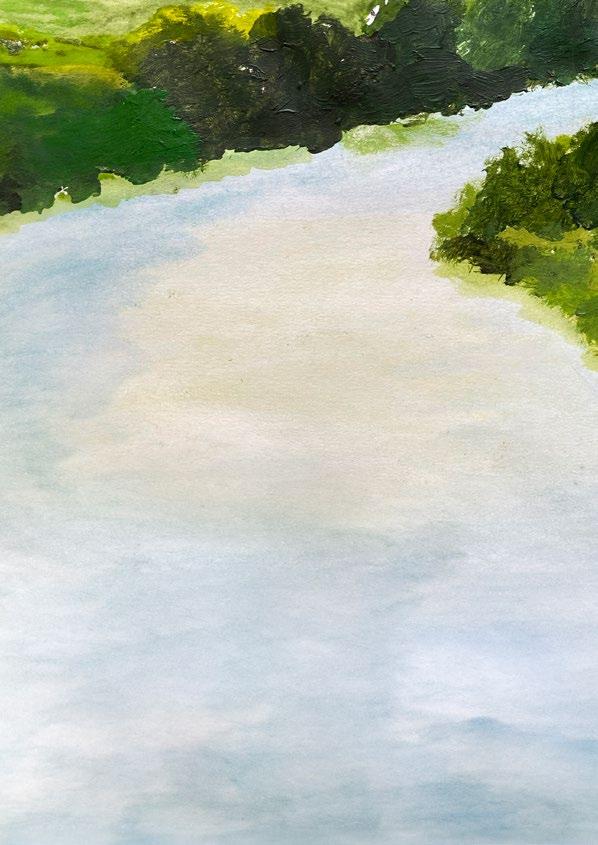
Cambyses II
A king crushed by a legacy so great, A promising prince. A pathetic fate. Cyrus the First and his kingdom of gold. The son who failed to match the monarch so bold.
Cambyses II was little more than a fool, A heart gone cold; a reign so cruel. Fires were lit by his insatiable rage, The Persian imprisoned in his mind’s own cage.
Blood ran red down palace walls, His insanity floated through palace halls. The execution of subjects all too dear Struck into hearts a mindless fear.
His realisation was all too late, His epiphany: he could not bear its weight. And so, he succumbed to his fate, Of being crushed by the legacy of Cyrus the Great.

As Cyrus’s line sputters and dies, By the grace of Ahuramazda, a new king does rise. In a realm fragmented, in discord’s embrace, Darius emerged, a sovereign’s grace.
From humble roots, he did ascend, So, his crown, Darius was to defend. Pretender after coup, he slaughtered and slew, Slowly and steadily, his renown grew.
As the rebellions, in time, were turned to dust, A devoted confidant next betrayed his trust. The bonds of allegiance, a friend turned foe, A heart once loyal, now stained with woe.
Such were the reckonings of Darius the Great, And the extraordinary empire he helped create. And so, when wracked with an illness; to claim Darius - its aim, Down from the heavens, Ahuramazda came.
It was then his glorious tale ended, thereof, And together, they soared into the skies above.
By Mayank Kalra, Lower Sixth


Artwork: ‘One Thing I Know For Sure’ By
Rohan Paul Muktieh
(Fifth Year)
The poem below was inspired by the prompt to use only monosyllabic words while still creating a meaningful text.
The one thing I know for sure
Is all that I don’t.
How to breathe?
I can show you how to choke.
How to smile?
You will find out how to scream. How to live?
Well, I will tell you how to die. Right now.
By Mayank Kalra, Lower Sixth
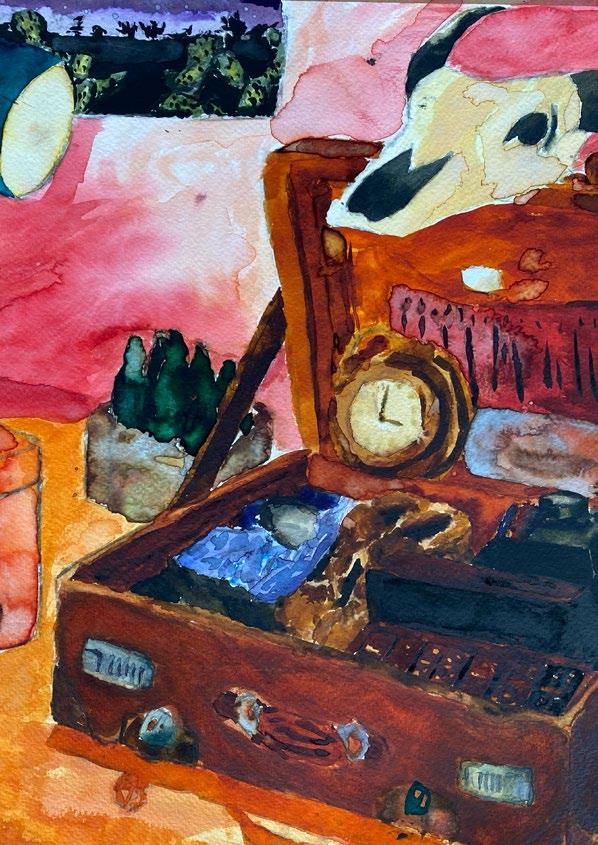
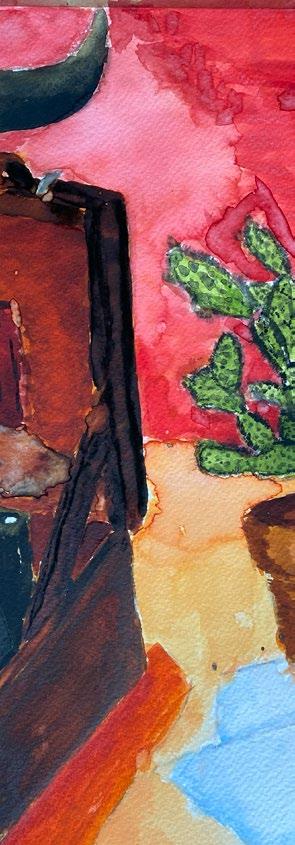
Artwork: ‘Memory Baggage’ By Basil Graham (Fourth Year)
Wading through the sea of clothes, I stepped closer to my vessel of woes. Crouching, now level with its battered browns, I observed its scars with many a frown.
This faithful bag well past its prime would serve me one last, final time. With care and caution I folded fabric and string, A cloak shredded by the ticking of a clock. Its fine garments were no longer fit for a king, After all, those times were now forgot.
Ah, that reminds me! A sewing kit, too. After all, I longed to make this case anew. A photo? But there were too many to take! I wondered if this was where I would break.
The pain of leaving things behind Was an agony of a different kind. Too much to see, too much to pack, Knowing that I would never come back.
By Mayank Kalra, Lower Sixth
By Alexander Barton (Third Year)
Rose lay out each shirt across the table, matched with coordinating trousers, socks, and jacket. The seasonally matched minty greens and tiffany blues. At the top, a gentle floral pattern adorned a champagne blouse, set with a navy pinstriped pleated trouser, and a gold buckled leather backless loafer. One by one, she carefully folded each in half, using the grain in the wood beneath to measure to width, before pressing each item flat with the iron. Taking care to maintain the smooth surface, she gently lifted each item, and neatly stacked them in the opened case, cautious to not lean the tower to one side. In the remaining space, laid cosmetics, each gently placed in a foam sleeve, so as to try and ensure the fragility did not catastrophise the internals of the case. Satisfied with its contents, Rose mildly supported the lid closed, and gently zipped it up, ensuring that she didn’t jog any clothes. Having made it to the flight check incounter, and located her boarding pass, she lifted the glittering rose-gold case onto the conveyor. The sign read 17.50kg, exactly what she expected and well underneath the 23kg limit. She watched as the tag was attached and the conveyer whisked it away, not to be seen until her arrival in Paris.
Having successfully made her way through passport control, Rose gingerly lifted the case off the baggage return, and inspected it for damage. Scratches stretched across the face of the bag, with grooves deep enough to sense by hand. One wheel no longer spun, and the handle frayed at one edge. As she got in the taxi, the driver chucked it into the boot, lacking care for what it would hit, introducing another scratch and smearing dirt from the previous case across the back face.
At the hotel, Rose braced for the impact, as she timidly undid the case to gauge the damage caused. The meticulously folded clothes lay haphazardly strewn throughout the suitcase, separated from their coordinating components, and creased beyond the repair of an easy steam. Despite the seemingly adequate protective measures, a greasy mixture of conditioner and moisturiser spread across one corner of the case. The sticky mess seeped through the multiple layers of fabric, darkening them, and creating an oily sheen that almost fluoresced in the artificial light. This did not worry Rose.
Crying over spilled toiletries would not refill the bottles. Carefully she began to separate the items into piles for rewashing, and those that simply needed to be re-ironed. Using the plastic bag from a local shop to protect the dated hardwood floors, she stacked the contaminated clothes and prepared them for laundering. Whilst they cleaned, Rose called down to reception to enquire the use of an iron. Handing them off to the doorman, she sat down and let out a sigh.
By Ben Claxton, Lower Sixth

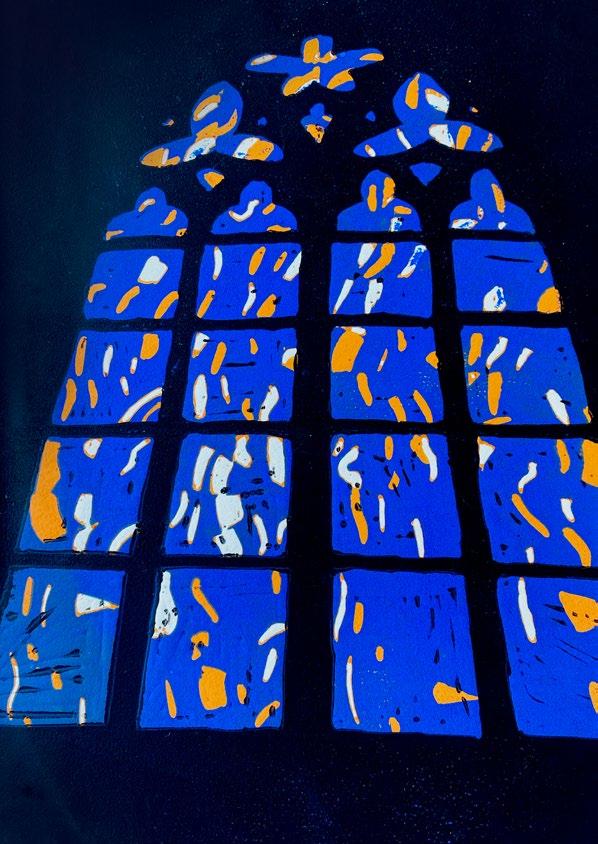
The leaves slowly descend on the town, a cold breeze whistles through the streets. Cobble steps sit, tightly nestled, scattered amidst the crowd of buildings, the pulsing veins of this labyrinth. They slowly fade before humble string that demarks a point of works, smooth, flat, rectangular stones advance, a geometric dance before the cobble rabble, that barbarism slowly erased.
A small, raw, gap of earth lies between the two. As the sun slowly emerges, one raised square flickers, light glinting off its golden surface, shimmering along the channels of its engraved text1. The skeletal hands of trees simply wait, little nubs of green waiting their time.
As they woke this morning, they heard the weather forecast. No rain. Harsh winds. Short winter. Early spring, soon. New births, warmer times, soon. And the old passing away. Soon.
They begin their new routine, stepping out the door, the wind bites immediately. They shuffle down boulevards, circuitous winding alleys, and humble pedestrian roads. Hunched shoulders and slight steps characterise their mollified march, as if they were slinking through a crowd, yet beside them are only dancing leaves and circling winds. Arms occasionally swing up, bracing against the dust and flecks of concrete emanating from the rump of a home, a mere ribcage of a structure.
They glance across the street to the home, its owners long gone. It is one of the last to be rebuilt. Only two walls still stand, one sliced across, the other decapitated. A fresh, sandy-looking, wooden frame, to stop the remaining stones from crumbling into the street juts over the top of the walls. Vines crawl up the decapitated wall, covering the empty window frames and suffocating the meek flowers in the pots that hung from the window, the last vestiges of which still cling to life. The sliced wall stands even more precariously, it appears as if cut from left to right diagonally. There is no smooth line of a blade, the angle is steep and the cut jagged, a reflection of the savage punch to the home. The epaulettes of the mural remain, the text beneath howls “ENDSIEG!”2. Two men stand by it now, one with a bucket of paint unceremoniously ploughs across the text. The other stands by, his column-like figure draped in dense, drab olive
green, with a fleck of blue, white, and red. He gives a free, cheery wave, one he can, safely bathed in the warm waters of victory and its soft embrace. They keep walking, returning a reticent flick of the arm, their age bares down on them. In times past the wave would have been a stern surge up to the sky with rigid discipline.
Now they slither along the chipped and scratched walls, the colours flicking between a fresh brilliant whitewash and a faded tan washed in grimy grey. They come to the barren square, behind it, the park, now reduced to an expansion to the graveyard. They sit on a worn bench, the paint peeling, curling round itself. There is one patch of metal still shiny, the crater of a chipping, the couple of faint black streaks that were there had already faded. It creaks as they sit, leaning their backs against it. They face the church, looking past the water that slips down the fountain, and then look left. They count friends’ parents, their own parents, and the old mayor from when they were children who ran through that park. All have a space there. Their friends, colleagues, and bosses are not here. Most are far, far afield, and those who stayed will have no dignified sandstone marker, for good reason.
“Bon débarras3”, the man by the mural would say. They unfurl the newspaper, a different one these days. They discuss the poetry of it, their old paper banned, their new one, once banned, one they would have never read before it all began. Sunlight bleeds down over them.
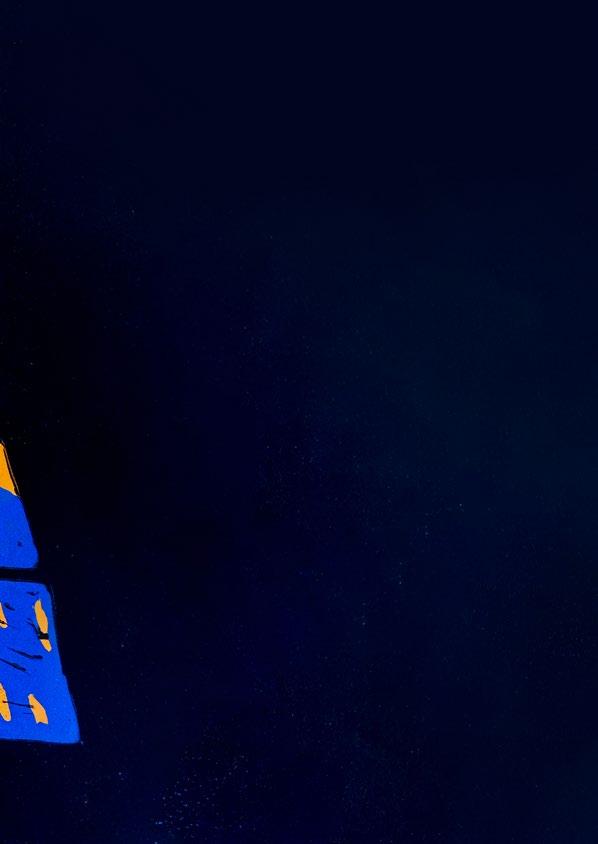
They come, walk through the square. One holds flowers, places them by a pair of graves. They stand still, bask in the sun and silence. They put their smooth, soft hands in each other’s, and talk about their future; university, jobs, children. Only one thinks marriage will come, she gives a playful wag of the finger, “You said the Wall would never come down, now look where we are.” They both laugh.
1 A Stolperstein, or stumbling stone is a commemorative metal block placed outside the homes of Holocaust victims across Europe, mainly in Germany.
2 German, meaning final victory
3 French, meaning good riddance
By Jasper de Linde, Lower Sixth
Artwork: ‘Rebuilding’
By Sasha Garkavenko (Fifth Year)
The man sits under the warm glow of the sun that floods the cloudless sky that sits still, like a shallow pond undisturbed. He gingerly reclines against the still chilly bench. His smooth features crease and crumple as the light floods his eyes. Swift, sharp, sudden gusts of wind make him shiver every so often; he draws his arms closer, thrusts his hands deeper into his pockets, and peers down to his shoes, the scratches buffed out, to push his throat against the warm scarf. As one gust dies down, the dove he’s been watching returns to its normal, graceful flight. He leans back and smiles. Here the trees stand tall with all their leaves. Here the ground is firm, and grass-covered. Here the screams are children playing.
She walks along the winding path, a spring in her step, she strides into her new life. The sun’s light like a soft hand warms her, and slowly revives her, the tiredness slips away. Last night was another storm, swirling, spiralling, closer and closer to her. Each time the creak of the opening door gets quieter, the smell less strong, him smaller, fading as the memories wither. Now ephemeral, a haunting spectre, a scar from an all too real wound. Now she truly walks, each foot placed firmly against the
ground, a tap, tap, tap marks out her steps, the time of silent shuffles is long over. A neighbour, a bony curl with grey cotton atop, marked with a vicious scowl watches her. She expects a veil. She will have to keep scowling.
They sit together, idle chat, quaint jokes, little jousts, and light ripostes. Soft and lucid babble begins to flood up and around. They talk about the new world, of new art, new people, new music. New plans to see the latest show, exhibition, concert rise with a simple “Wir können…” They spin round with hopes of seeing each other again, again, again. Forever.
The scar remains. With each probe, question, little pause before an answer, it’s worn, like there was a dull blade caressing it, sharper, harder, faster each time. Her open mouth before the words “My late husband”, the glance to the man walking by with war scar, the shudder when two men, idly chatting, with Freikorps armbands, walk past. He knew men like them, hounds to each other, and the rest of the men, a savage pack that picked on the ostensibly “friend” and “foe” alike. They see him, fresh faced and soft featured, and spit once they pass.
By Jasper de Linde, Lower Sixth

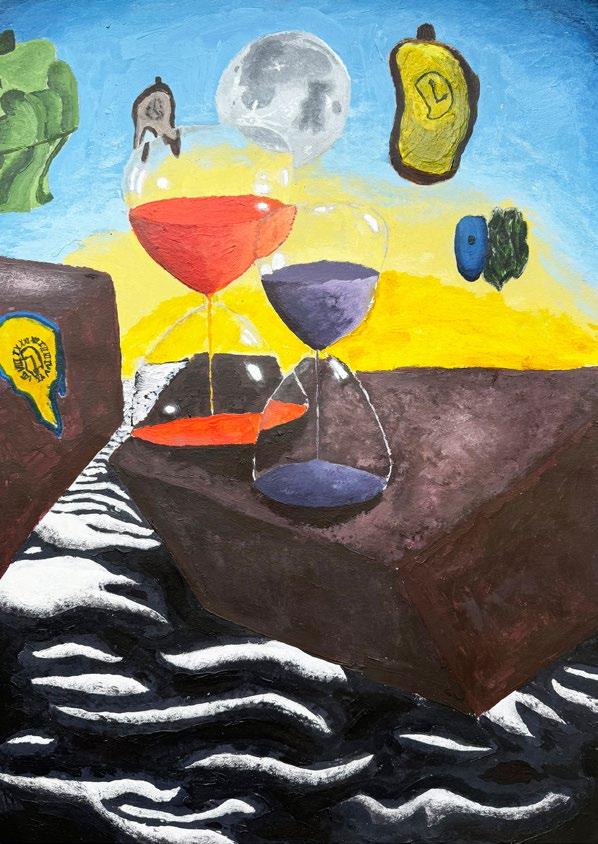
TimeBrady trudged along the path, shading his eyes. “Tom!” he yelled, “wait up!” The building they were headed towards was at the bottom of the hill they were on. It was all wood, half rotten, and the stables next door had collapsed completely.
“Tom!” Brady shouted, as Tom laughed, way ahead of him.
“Hurry up!” Tom shouted back, as he ducked inside. Brady quickened his pace, and soon entered through the door as well. The interior was relatively small, and very dusty. The room was dominated by a thick wooden pillar in the centre, which held everything up. Opposite the door was a desk, and on top, a very old radio.
“Cool” muttered Tom. “Let’s turn it on!” They both jumped back, the static was incredibly loud. Once they turned it down, Tom turned the dial.
A voice came through the radio. “Hello, please is anyone there?”
“Yes, what’s wrong?”
“A storm came, I was alone, a beam fell trapping my leg, it hurts, please help, you need to help me”.
“Where are you?”
“This building, I was there with my friend...“
Artwork: ‘Time’ By Theo Groves (Fourth Year)
“Brady! I’m gonna go get help, ok?” Tom ran out, heading back up the hill. As he left, the wind howled loudly through the door, blowing it off its hinges. Brady turned back to the Radio.
“My friend Tom has gone to get help, where are you?”
“I told you, a build… wait Tom? What’s your name?”
“Brady, why?”
Static hissed through the radio. Then Brady heard a yell, a massive crash and the central pillar holding up the roof came crashing down. A beam crushed his leg, trapping him by the desk. He picked up the radio and yelled into it.
“Hello, please is anyone there?”
A voice, concerned, but not over worried came back. “Yes, what’s wrong?”
The words came gushing out of him as he described his predicament, the storm, that he was alone and trapped. He begged for help. Then the person on the radio said their friend Tom had gone to get help. Thoughts raced through Brady’s brain, all confused. He stopped his sentence mid flow and asked “Tom? What’s your name?”
He got the answer he dreaded. Brady. Then what remained of the roof came down, crushing the radio.
By Matthew Pickles, Lower Sixth
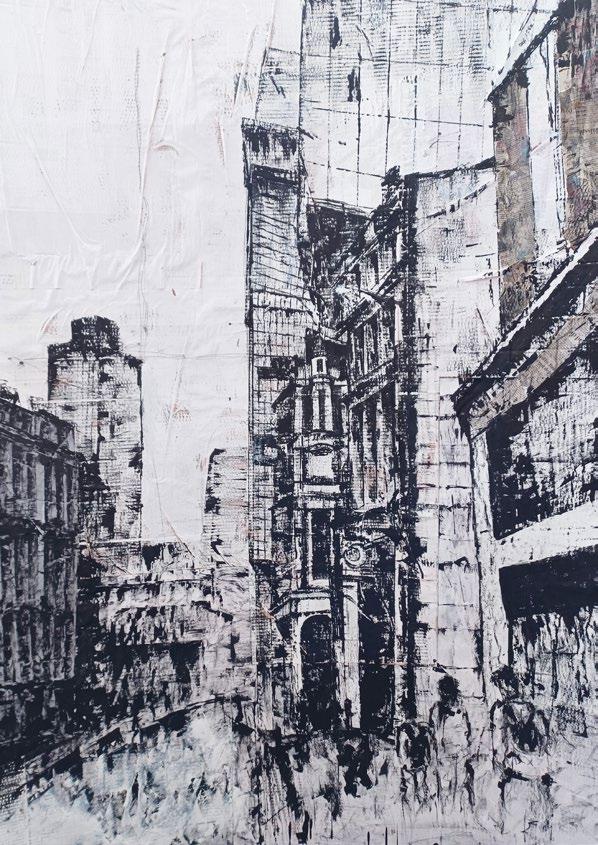
By Gabriel Mormol (Lower Sixth)
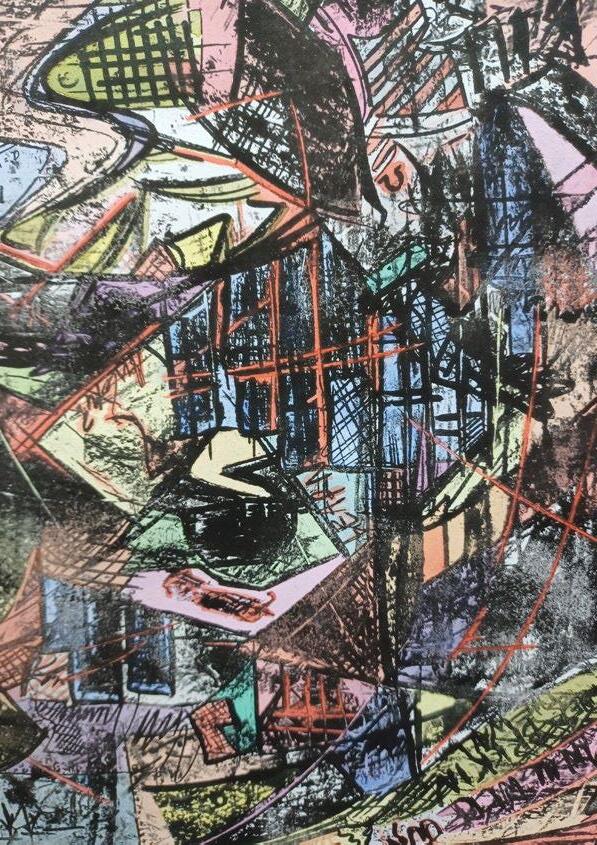
I spent months in a beautiful, sunlit room, just hanging there, as I came into being. Paintbrushes stroking me day after day. My artist stared at me with such devotion, such love. And I stared back, equally full of wonder and amazement. Then, one day, she wrapped me up, and I was carried around in the dark, but then hung up again in an unfamiliar pace. A wide, dark hall, echoing with the footsteps of other humans.
When the lights came on, I was surprised. On all the walls, next to me, opposite me and all around, were more paintings. Paintings of other people, paintings of animals, paintings of sunset and fruit and all kinds of wonderful things. All so beautiful, and when the people came, they stared at us with such admiration, pointing small black boxes at us, which flashed with light. And I stared back with admiration too, for these people, all these people, were here for me! The looked at the other paintings too, and they saw me, and I realised, that here was where I belonged.
But now I am admired by just one. I sit alone, in a large, furnished room, the person who put me here hardly ever looks at me, and then only briefly, with disdain. But then there’s the little boy, who looks at me with such wonder, much like my artist did so long ago.
By Matthew Pickles, Lower Sixth
Darkness. A musty, old smell lingered in the air, an undertone of dying rodents making it unpleasant to the senses. Not that anyone was here anyway. Faded roses patterned the walls on a background of sickly pink, matching with the threadbare crimson carpet, both as depressingly worn as the other. A large metallic shape sat squatly in the corner, its grey rusting surface encrusted with switches, dials, buttons, keys, knobs, and levers, each caked in layers of dust. The large screen that dominated most of its appearance stared blankly outwards into the room, swallowing any light like the horizon of a black hole. A single red light on its panel blinked steadily, weak, but there, sure and true like a beating heart.
A chatter of voices floated out from the door. Thousands of hands ran over its surface, many fingers pressing, flicking, pushing, turning, twisting, tapping. Zeroes and ones scrolled endlessly, trillions of numbers and commands per second, processing incomprehensible figures and connecting to billions of locations around the world.
The second hand scrolled slowly around the clock, counting down the infinite minutes and hours. He rubbed his eyes, reddening the already raw bags of skin that
hung loosely around his sockets. He swivelled on the chair, which creaked unhappily underneath his weight, and began to type. He rubbed his eyes again and looked up at the vast monitor before him. The ones and zeroes kept scrolling, going on and on into infinity. He turned his head to look at the clock. Groaning, he rolled his eyes towards the direction of the sound, a small monitor located on the far left of the control panel. He had to squint to make out the small letters that were displayed in front of him. He stared down at them. They stared back up at him. A cold rush of air washed through the room, sweat poured through his shirt, forming dark stains underneath his armpits, another forming on his crotch. Swallowing the large lump that had formed in his throat, he moved his trembling hands towards the panel, and took a deep breath. The ones and zeroes roared, shooting out tendrils of information which raced across the globe, unstoppable. The weaved their way around rocks, underneath cities, zapping across molecules and shimmering through atoms. Then they stopped. The earth rumbled, and a tear rolled down the man’s face. In his glasses, you could just about see the reflection, a small but hauntingly terrifying sight. The orange mushroom-like cloud bloomed in the clearness of the reflection.
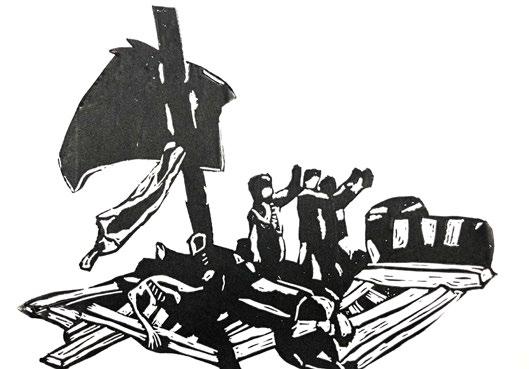
The clock sat there. Silent. The second hand no longer counted down. There was nothing to count down to. Time no longer had a place in this barren, desolate world, no purpose to serve. A sigh seemed to waft out from underneath the machine. The light blinked once more.
Darkness.
By Archie Hurst, Lower Sixth
The sun set over the bay, its looming appearance on the horizon dwarfed by the many numbers of shiny white yachts that sat, their huge hulls bobbing steadily up and down in the waves that lapped gently against the cobbled stone of the harbour.
Music floated out of open windows, creating a strange hum that was attune to the serene mood that was emerging in the coming of the evening. There was one anomaly. Lights buzzed. Large, colourful luminescent letters twisted themselves into a multitude of different shapes and forms, beckoning callously to the passersby. Sickly red velvet carpets lined the entrance halls, fake ornate gold lions roared sneeringly from atop the various buzzing, beeping and blinking machines, each displaying numbers, seemingly incomprehensible amounts, the word ‘WIN!’ being screamed over the droning decibels of noise. An aura, a mix of despair, disappointment and raw anger emanated from anything living that had been drawn in by the deadly trap of money.
Artwork: ‘Hustle’ By Will Fox (Lower Sixth)
Amongst this chaos, a shining beacon stood out. The small, shiny, metallic ball rolled around the never-ending circle of doom, a whirlwind of emotions flew about the room, anxiety and anticipation bouncing off the walls, excitement radiating at intense levels incomprehensibly high. The buzz of activity rose as the ball began to slow down, servers walking slowly to look at which number it landed on, beads of sweat forming on the foreheads of those sat at the table.
She remained calm. She had done this many times before, each calm as the next, cool, calculated, knowing exactly what she was doing. The ball rolled slowly to a stop. A cheer erupted around her, the other big, beefy, men in expensive suits sitting around the table groaned with disappointment. She smiled. She always won. That was the hustle.
By

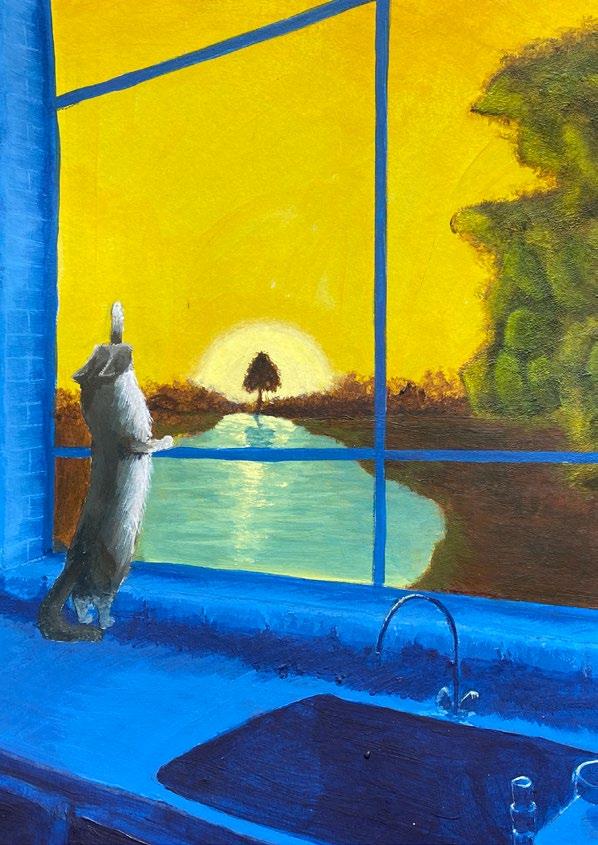
By Sebastian

World War Two remains one of the greatest successes of Churchill’s time as prime minister. However, few know about the effects that prioritising European food security had on his Asian empire in India and beyond. Though his direct responsibility in the causing of the so-called forgotten famine remains in heavy contention until today, this piece brings to light the struggle of the three million that lost their lives in the Bengal famine, while it ravaged the subcontinent in 1943, and the many lives that were irreparably changed.
Hot. Sticky. Sweaty. Aayra stirs. The sun’s rays too strong on her face. It’s 5 o’clock. The sun, her daily alarm clock. The truck gets in at 12. It’s a six-hour walk. She’ll make it. But she needs to leave now.
Aayra gets up, plucking the odd strands of straw woven into her back after another night of tossing on her floor mat, which she rolls up and tucks against the wall. She has barely slept, her eyes heavy in their sockets, but she hasn’t the time. She has to go. Pursing her wrinkled lips to safeguard what little moisture her throat still has within it, she stands up and walks the two steps it takes her to reach the other side of the small mud hut that she calls home. As a child she used to think that her home was so big, an endless expanse for her to get lost in. But that was before. Before she became a woman.
Her brother doesn’t stir, his chest moving up and down in organised waves. Up. Down. Up. Down. A flickering breeze blows his thick black hair, revealing the soft skin of his sunken cheeks, the warming shade of caramelised honey on brown toast. Aayra pulls back the lilac sheet suspended from a plastic rail, revealing two half-filled buckets. Closing the curtain for privacy she relieves herself in one, before using the water in the other, only slightly clearer, to wash her face. Using the back of her hand she wipes the specks of wet sand turned mud off her lips and lets out a long-suppressed sigh. To most people the water would smell like dirt, a moist face plant into rain clogged mud. But to her it’s the epitome of cleanliness. With the sound of grasshoppers humming along to her brother’s snores ringing in her ears, she begins to undress, her torn top slipping off her shoulders. The perforated zig zag ridge of a burn mark she got when she fell into the fire as a baby. A line when the whip was hit a little too hard. A stamp from when she was branded, an object from birth. Her skin, a map of her long life’s experience. A mere drop of the ocean of that which lies within.
Changed, she pulls back the curtain and hesitates over her brother’s mat. She doesn’t want to wake him. Not now. She still remembers the disappointment she felt when her Mama used to shake her awake in the morning four hours before school to make sure she had enough time to fetch the water. She wishes she had known how lucky she was. She would do anything to go back to her school days. Feel the warm sandpapered hand of her mother on her skin. But that was before. Before she died. Before Aayra had a secret. A secret she couldn’t tell, no matter how much it ate at her inside.

It’s 5:05. She’s late. There’s no time to waste. Innocence is nothing more than an ignorant bliss, and within ignorance no one can exist.
‘Oi,’ Kabir jostles in his sleep. Leave me alone.
‘Nai, you have to wake up. Chaal, utho.’
He keeps up his mock resistance for a few seconds more before feigning surrender. His sister goes along with it. She doesn’t realise it’s a mask, a pretence to cover the time it takes to muster up the strength to get up. She doesn’t realise that he was never asleep but awake. That his hunger keeps his sleep at bay. His ribs pressing against his skin, too much pain. His daydreams too strong, too hypnotising, of swimming in a pool, eating a piece of fruit, drinking a cold drink, that they make him delirious. She doesn’t know. But he doesn’t blame her. Hunger kills everyone. She’s no different. It robs you of even your most instinctive abilities of perception. Of analysis. Of thought. When you starve there’s no spare energy that can be spent on anything other than survival. And Kabir knows. He has no choice and neither does his sister. And so the best thing for him to do is be good and listen.
Outside it’s hot. Deceivingly so. The sky like the ground. Sandy brown and dry. They walk side by side. Two soldiers marching on. Dragging their feet and painting the sides of their sandals with dust. Aayra has a little stone snuggling in between her toes, burrowing itself deeper and deeper. The sharp edge scraping like wood with every step. She doesn’t move it. The pain distracts her, the splintering of her skin. The prick of wetness cool against her foot.
They walk in silence. They walk without stopping. They walk in unison. One step after the other.
It’s almost 12. The sun at its peak. Like a well-trained army. Ready to defeat. Like a stranger staring you right in the face. Kabir slows, shading his eyes. his left forearm lifted to the sky. His face is hot. Dry. Red. All moisture long squeezed out, sweat a luxury he can afford no more.
His skin. It burns. Inflamed, like roti bread swelling up in a tandoor. Eaten away by mosquitos, the comforting stings a reminder he’s still living. A known in the unknown. A reminder of his normality.
He never used to like the mosquitos. But now he does. It reminds him he’s still desired. Even just for his blood.
Blood. Fresh. Juicy. Tasty.
No, no, he can’t think of that, he’ll go crazy, he can’t think of that, no, no, he mustn’t think of that.
Kabir let’s himself slow ever so slightly before half running, half falling to catch up with his sister. Aayra hears
the starts of her brother’s wheezes and slows down to accommodate. The last thing she needs is another asthma attack. The last time he had one her father was still here. Now he isn’t and she wouldn’t know what to do. She can’t take that, not with her secret too.
Her skin feels tight, sticking to her skull, dry and tough like a decaying cow hide. She spits in her hand rubbing her fingers together until her saliva forms a bubbly lather, before smearing it on her face, filling the cracks in her skin like cement filling those between bricks. It soon dries, forming a thick crust of protection. She tries to do it again, but her mouth denies her the moisture.
‘Aya, are you ok?’ Aya. A name he has called her since birth. When he wasn’t able to pronounce her full name properly his face creasing up in frustration whenever he tried so that he elongated the sounds to twice his size.
‘Aaayyyaa. Aaayyyaa.’ An heirloom of the past clinging on. Desperately.
‘Ha, badhu saru che.’ Everything’s alright. She decides to lie. Because it’s always easier to hide than reveal what’s eating her up inside. Her secret. No. She must keep it hidden. If he can tell something’s wrong she will have to do better.
She needs to do better.
They continue walking. For how long neither of them knows. The shuffle of sandals over sand the only sound to break the silence.
Kabir doesn’t see them approach.
And neither does she.
‘Oi, Aayra,’ a voice calls out, the harshness so different to her brother’s it stops her in her tracks. She turns around and that’s when she sees them. The village boy. A herd of them. The boys she watched grow up, took to school, watched take their first steps. A hoard of them. The boys she used to cook for. They know her secret. And deep down she knows they’ll use it against her.
It happens fast. The shouting. The swearing. Their demands for food. Aayra’s pleading stomach. Their demands for money. Their hands groping her, as they search below her clothes. Their sharp nails drawing dark blood and scratching bone. Kabir crying. Their demands for her to undress. Her flinch as she felt the hands run along the birth mark in her inner thigh, the one blind to all but her mother’s eyes. Her held breath as their hand lingers there in between her legs. Their laughs. Their shouts. They are bigger than her. Muscles, broad shoulders, they are stronger than her. Their forced heads held high. Her fear as they tell her what’s she’s tried to hide. Take off your shoes. She knows what’s near. Their eyes. How they widen when they see what’s tucked up inside. Money. Her money. Her money for her rice.
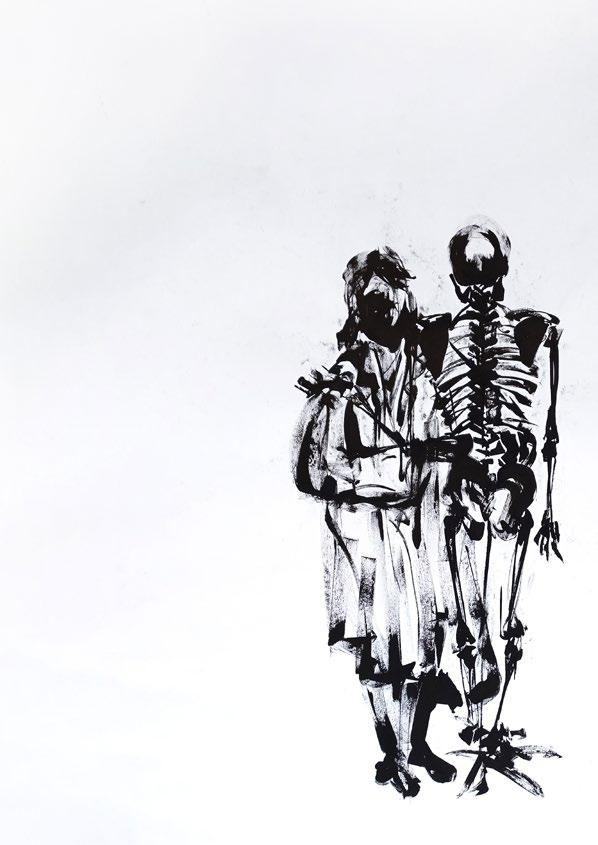
It happens so fast. Their leaps for the thin notes of paper. Their grapples between themselves. Former allies in competition. A free for all. A battle for survival.
Kabir. Not crying. He’s talking. No. Screaming, shouting, roaring like an untamed lion. He grabs a fist full of dirt from the floor and hurls it at them. It creates little more than a cloud of dust and they laugh.
Their power. His lack of it.
That infuriates him more and he lurches. His fists longing for their skin. Pounding. Pounding. Pounding the demon within.
It happens too fast.
The boy. At the back. The rock. The hit. The blood. The boys’ smiles now gone. Kabir stumbling, falling to the ground. Aayra standing. Doing nothing.
Like a dream. A nightmare. A devilish scheme. The boys. They run. Money notes fluttering. A sliver of gold sandwiched within brown fist and thumb. Skinny skeletons. Lost. Forever to the wind.
And then it stops. Her world comes crashing down. And only then does she truly realise what they have done.
Kabir lies motionless. Curled up like a foetus in the womb. Like those old pictures. The ones in the hospital waiting room. She ignores the ground stained a dark crimson. Tells herself that’s he’s safe and sound. She doesn’t cry. She hasn’t the time.
It all happened too fast. Her face too dry.
She feels a breath escape. A burden. A stress relief. She’s jealous of him. Sleeping soundlessly. Her brother can rest while she must go on. She doesn’t blame the boys. Famine brings out one’s worst. She thinks of her secret. How Kabir never knew it. But those that took him did. And they used it. She wishes she could tell someone even if just in a whisper. The weight of the secret is heavy on her shoulder. A strong rock. She must not falter. She never got to tell it. Not even to her own brother.
Taking Kabir’s still warm foot in her hand she walks, his body dragging like a tractor bulldozing the ground. She pulls him as she advances.
One. Foot. After. Another.
His skin scraping the floor, the top layer peeling off. The skin of a ripe mango revealing the reddish pulp beneath.
One foot after another.
She tells herself he’s resting. Eyes closed. Peace accepts him. She has to go on. At least until it’s her turn.
By
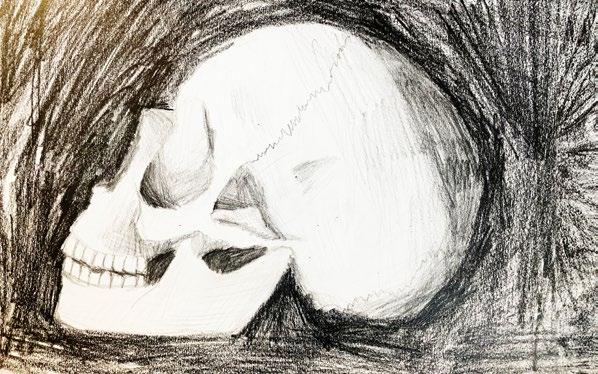
She remembers the song her mum used to sing to her. When her brother was asleep, and she awake. When her demons kept her up, her secret heavy on her head. The secret that only her mum truly knew how it felt.
Her feet move to the beat of the words.
Phoolom ka taaron ka sabka kehna hai,
Ek hazaron mein meri behna hai,
Saari umar humein sang rehna hai…
Flowers and stars, the whole universe sings,
One in a million is what my dearest sister is,
All our lives we must stay together…
1pm
A girl approaches. Scraggly and worn. But it’s not that that the two soldiers first noticed. It’s the boy she’s dragging by the foot. No older than five. Dead. How. Famine. How long. They’re not so sure. The heat does things to bodies you wouldn’t believe.
The girl approaches. The line to the truck now empty bar the two soldiers, one shovelling fruit from a can, the other standing with his gun. The bags of rice behind them, silent ghosts watching on.
‘Khavanu,’ the girl says forgetting herself and her manners. ‘Food.’
The armed soldier doesn’t understand, not familiar with the twists of a foreign tongue. The other, continues eating, unfazed. He waves away the hovering bluebottles with the vague swipe of his arm. Releasing her left hand from her brother’s right foot she lets it drop, and starts to mime, one hand the bowl the other scooping the invisible rice. The soldier continues to ignore her.
‘Khavanu’ she says again, more desperate this time, the question in her eyes too strong to disguise. The boy’s foot lies on the floor, three sharp indents around his ankle, three trenches for the girl’s nails. Three flecks of blood dried on her blackened nails. ‘Khavanu.’
‘You’re late,’ the armed soldier says, his white skin shining under the sun. Two words, and yet a message of a thousand words unsung. You’re late. Too late. Too late for life. The girl doesn’t understand but comprehends what he says. She thinks of all the times when she was teased for being the only one to turn up to school early, ready for class, to take on the world. She can’t help but think of how naive she was then.
Her eyes close. Too long for a blink. And when she opens them again, you can see her secret within.
‘Bhaat,’ she says pointing to the white sacks behind the soldiers back. Rice. Bags full of it. This time, he doesn’t pretend.
By Jamie Roblin (First Year)
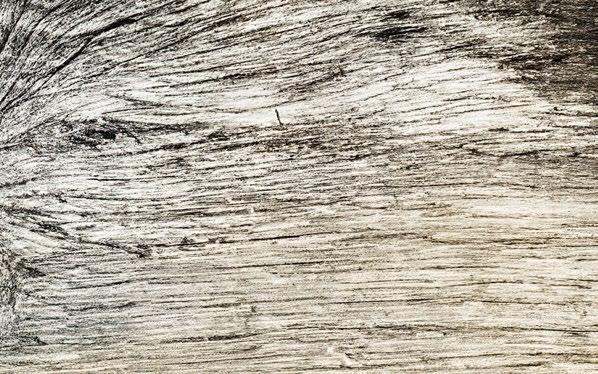
‘It’s not for you,’ Cut straight to the chase, his eyes looking everywhere but her face. Out of sorrow or sick humour, it’s all the same. Both just feelings to get rid of the same sense of shame.
The other soldier has finished eating, wiping his mouth with the back of his hand. Leaving a juicy smear on his skin, he licks his lips and puts down the empty tin. It doesn’t take long for the swarm of bluebottles to start feeding on the liquid left inside. Moving on from her brother to something better. All but two follow the sweet sugary scent. Two stay, fixated on the yellow pus seeping from a cut on the dead boy’s head.
The girl doesn’t move, standing there expectantly. ‘The rice isn’t for you. It’s exports, it’s not for you,’ he explains. Again. To whom, no one’s sure. ‘It’s for the soldiers that are fighting in the war. Come back tomorrow.’
The girl still doesn’t know what he is saying. All she knows is the bag of rice, sagging under its own weight. She knows the day’s ships have already set sail from the dock. That rice is not for anyone. And yet they watch.
‘Go. We haven’t enough. It’s Churchill’s orders.’ He is losing his patience. An invader of a foreign nation. The girl doesn’t understand him. He doesn’t understand her either.
She manages though, to make out a word, the name of a faceless man. Churchill, she thinks. Invisible. Like her Mama, Papa, the faceless ghosts that visit her at night.
‘Show me the Churchill and I will speak to him. He will be a good man and see we have no rice,’ she says in Gujarati, her words thick, like flour stifling the air. Her parents never taught her English.
The soldier sees a short brown girl. Sun parched skin. Dirt caked in her hair. A rag for a dress. Ripped in a way it forms little more than a leash on her neck. Her bloodstained legs standing protectively in front of the boys and his bent leg. The cut on her arm, rough and old and unsealed, the unpleasant perfume of hot flesh in the sun. He laughs at the foreign words, the way they poke at his ear. He laughs. The other joins in. The two of them. An army of white teeth glistening.
She looks at them and she feels exposed. Her secret leaving her vulnerable and oh, how they know. Shanti. Peace that’s how she thought it would be. When someone finally knew, and she could let it all out. Loss, sadness, days of suppression. But now she wishes, it hadn’t come out.
It’s almost 2pm. Her secret just like her. Naked. Exposed. Her secret. That today is her birthday. She has just turned seven.
By Aaran Thakore, Upper Sixth
It’s a fact. History. Set in stone. Words written in a book you may very well own. One I won’t ever know. For me it’s too late. But that’s not the same. Not for the current 82.4 million refugees globally whose futures are not up to fate.
Have you ever wondered how long it takes to destroy 80,000 Ugandan lives? 23 minutes and 19 seconds. 23 minutes and 19 seconds of meaningless commitments and vague hand gestures. 23 minutes and 19 seconds of a single voice distorted by the overly loud air conditioning in the corner. 23 minutes and 19 seconds of the same message just different words. That we are no longer welcome here. Eh, we never really were.
23 minutes and 19 seconds was how long it took for Idi Amin to crush me. Slaughter my hopes and watch them rot. Mine and those of 79,999 others. Because it all changed at ten past eleven, with the rising of the red, yellow, and black. Just like the one in the kitchen. Our nation’s flag.
‘Tukusanyukidde, Uganda,’ he had practically shouted. Ironic. Welcoming Uganda to deport the Ugandans.
‘Eh, why you lazing like dat?’ My mother, angry. Again. I feigned ignorance. ‘Abbo, I’m talking to you. You under my roof, you help me. Here come. Help me.’
‘Maama…’ I didn’t say anymore.
Because in 95 days. In 95 days, I die. I know that because in 84 days I forget to brush my teeth, and in 87 days I undercook the rice, and in 91 days the lights were turned off. Since then, they haven’t turned back on.
‘Change the channel. And turn the volume down. I’m going to go deaf.’ I gave her a look. She got the message.
‘Don’t worry yourself about that, Mukwano. Dear. He’s not doing anything. You know these things. Nothing but lies.’ She rolled her eyes. Just like how she used to when I was younger and asked her a question she didn’t know the answer to, like ‘Why is grass green?’ or ‘Are we ever truly free?’
And I believed her. An offhand remark soaked up instinctively, like a dog obeying the stupid commands of his drunken owner. Just three words and my worries were washed away. Why hold concerns when you simply do not have the space? Because we, we have that trust. The trust buried as deep as the soil that feeds us. We are a loyal people. We love, we laugh, and we respect. So, when she said ‘these matoke aren’t going to cut themselves’, I did what she said. My rough skin warm against the cold knife. Little did I know that I would pay for that with my life.
Soldiers are here. For the first time. One woman, one man, one old, one young, one tall, one short, both clutching guns perfectly placed in their palms.
‘Eh, good morning, soldier,’ Maama says, proudly, opening the door. It’s been days but she still doesn’t know how to act around them. Recognising the face of the woman as our neighbour, and good friend, she adds, ‘Ah, Namono, oli otya?’
Auntie Namono hesitates, glancing down at the floor, before replying. ‘Ah cousin sister, I’m good,’ the harsh English words bare stripping my mother’s Luganda leaving it bare and exposed. She knows my Maama isn’t good with her English.
‘You heard President Amin. All of Asian descent have 90 days to leave. That was six days ago. Here, complete this,’ she extends her arm, holding out a clipboard, in which a sheet, ‘Identification of Asian Household Number 9973’ is neatly tucked.
Number 9973. The last prime number before 1000. I have never hated a number so much.
But before Maama has a chance to take it, Auntie Namono pulls it back. ‘Actually,’ she begins, a smile spread across half of her face, her headscarf, the same one Maama wears, shaking in the wind with no restraint. ‘I’ll do that. Save you wasting ink.’
Maama sighs overtly, and I realise that she still trusts her. I watch. An onlooker in my own home. Watch as a familiar stranger scribbles down my life. Reducing me and my family down to our looks, our physique, our blood boiling beneath our skin. Like an estate agent in the process of a house inspection. She knows us. Owns us. And I start to notice the cold.
My mother stands. Awkwardly. Fiddling with her hands. ‘Would you like to come in? I can make tea.’ I have never seen her like this. So uncomfortable. Scared, even. Afraid. A child begging to be saved.
This time it’s the man’s turn to make a noise. He chuckles, a sound that both frustrates me and makes me feel at home. I feel an eruption of warmth spread inside of me. I mistake it for anger. Not something more. He doesn’t stop laughing. Loudly. He’s so loud. It’s all so loud. Everything.
It’s all too loud.
Namono, doesn’t say anything, pretending to not have heard. Maama’s words linger, choking, suffocating, like a child drowning, gasping for air. Namono’s inebriated eyes widen slightly, her pupils dilated. I hate it. I hate everything about it. Maama. She stands. Unsure how to react. Her friend so busy documenting her existence on a paper she won’t ever see. Restricted to a statistic, just one of so many.
Namono moves forward, her tall figure imposing over my mother’s crooked frame. She dwarfs her. I feel a tear in my heart when Maama doesn’t look her in the face.
‘Cousin sister, sign,’ she says, practically thrusting the chipped clipboard into the soft cushioning of my mother’s rounded bosom. Cousin sister. A term only used for those most dear. How can friends turned enemies do so overnight? I want to say something, but I choose not to. Speaking could make it worse.
By the time they leave, Maama is shaking. Really shaking.
‘That was not okay,’ I say, raising my voice to match the strength of the one in my head. ‘Namono can’t do that. They’ve made you so late for work.’
She closes her eyes and takes a deep breath. ‘It’s Auntie Namono to you. And I’m not working anymore. I quit.’
I don’t ask why. Somethings are best left unknown. Because today was the first time, but I doubt it was the last.
We know what we’re doing, Jajja, Maama and me. But we’re doing it anyway. Having dinner, the three of us. A dinner before our lives change forever. We know it’s risky. Just the other day, they were at our friends across the street. Barged through the door and forced them to leave. Eh, the children were still taking their bath. They just stood there, naked, wet, rocks piercing the soft soles of their bare feet. The older one didn’t even have her underwear! They were just girls, ay! Even us three women are not safe.
‘O, you know they say he chose 90 ‘cos it was the answer to one of them maths puzzles in the newspaper,’ Jajja mutters, barely a whisper, her hands shaking as she looks for a place to put the stew.
‘Kiki? I heard his house was built by Indians, and they painted the walls the wrong colour. That’s why he don’t like us, ay. Because of paint! Look. He had an Asian helper until recently. And he liked her. Only got rid of her because he didn’t want it dirtenin’ his image,’ Maama chips in, tutting her head in that disapproving way of hers, as she takes the large pot from her mother’s frail hands. ‘The people who get angry at us when we’re all the same, are the ones to get angry at us when we’re too different.’
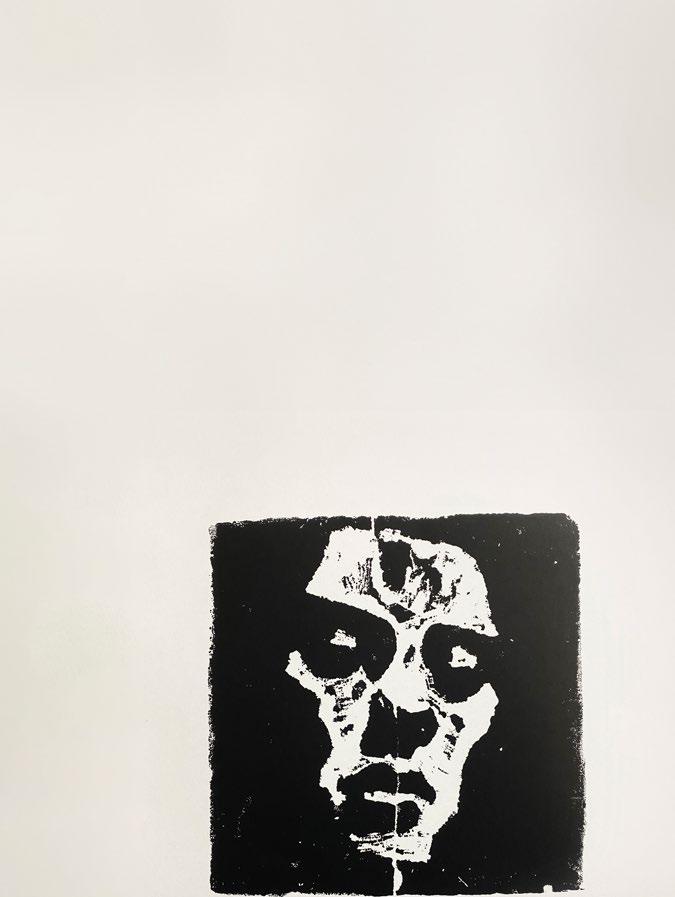
Artwork: ‘I am Uganda’
By Tom Milton (Upper Sixth)
I close my eyes. Let my stomach subside. I know that feeling. Guilt. Jajja didn’t want to leave because her daughter weren’t and Maama weren’t leaving because of me. But I can’t. Can I? The chances of my business succeeding without me, well those figures don’t need a genius to work them out. I didn’t become the first businesswoman for nothin’. Numbers were my constant. The factual in the fiction, the reliable during constant indecision. But what if something happens. That’s on me. It’s not impossible. Look at the statistics, eh? Those numbers don’t comfort me. They can’t. That’s never happened before.
‘Eh!’ Jajja leans over and blows out the candle, before clasping her hand over her mouth in delayed selfrestraint. The smell of burnt ash lingers, tarnishing the sweet scent of spices sauntering sleepily from the Rolex. I still remember when a tourist thought a Rolex was a watch. The joy of Ugandan food! I look up, about to say something, when Jajja’s nervous eyes freeze my tongue in its track. Something’s wrong. Outside. A lamp. No, a torch. By the window. Close. Too close. No one says anything. The sound of rocks squashed under heavy boots. It gets closer. Then stops. It’s only when Jajja’s gone and Maama touches my arm that I realise I hadn’t even dared to move.
There’s a knock at the door. So quiet. It’s almost midnight. We look at each other, daring the other to speak first. The voice outside, weak like my father, takes the choice from us.
‘You have been reported. We know you are there.’ How can they? We took such care. My mind whirs. Was it our neighbours? No. We are a loyal people. Not one full of haters. They wouldn’t. They couldn’t.
They don’t bother waiting. We have nowhere to go. The basement the last safe place.
Our home.
It happens so quickly. My mother screaming as they drag her by the hair. Her body, a limp doll on the stairs. The soft sound of a whip, hard rope hitting hard floor. Again, again, again. Almost peaceful, like a wave lapping on the shore.
But the whimpers. The whimpers from above. The men. Two of them. Laughing and smoking. The man, young, who takes me up to watch. There’s blood on her. At the bottom of her dress. The one that’s lying on the floor. Scrunched in a mess.
I know what’s happening. I’ve seen it before. I don’t cry. Beg. Plead. Feel. I let be the stillness; its soft arms embrace me.
There’s no need to be weak.
I know how this goes. Tears, dried, shed long ago. Life. Gone. For me. Lost.
All those years I have lived here. All those years that I won’t. We are no longer a loyal people. And the whole world, oh, they do know.
It goes. Off. My body. I fall. Hard skin against hard wood. Ringing. Deafening ringing. Soldier withdrawn. Then silence. Silence. So soon.
Too soon.

Bare. Naked. Battered and bruised. Thin rivers of red on a black charcoal moon. She doesn’t look at me. Kneels silently. A small scarlet pool filling between her legs. Guilt. Guilt for not stopping it. Guilt for letting them. Guilt for being thankful that she was always much more beautiful than me. People used to always say I got my dad’s brains not my mother’s beauty. Those words now take on a different kind of meaning.
That blood. It’s on my hands. I know. And she does too. I Caused This. She gave me life and I stole hers. Her body now doesn’t belong to her.
I don’t look. I can’t. I hear it go off. The slow slumping sound. I cry. No scream. Just a primal howl with the sharpest teeth. Then silence. It slaughters me. No number can predict the work of the human psyche. Pain.
Inexplicable pain. A thousand daggers slicing my veins. I sink. My entire insides. Drown, suppressed, under water without a sound.
I lunge. The soldier doesn’t jump. My fists long for his soft skin. I don’t listen. Not when they speak. So quietly. What is the point when I’ll never be free. Because that’s when I know. To live or to die, I won’t ever survive. My life will never, ever, truly be mine.
Have you ever wondered how long it takes for a life to change? 23 minutes 18 seconds it took for me to meet my final fate.
At a time where thousands of lives did change. The world, well, she remained the same. Looking on. Indifference unexplained. A silent, silent, single state.
The sun shines. The sky clear. I think of the voice, and I feel the fear.
It’s loud. Too loud. Children. Crying. Eyes creased with blood. Hands clawing ground, rummaging through the corpses of their lives. Bombed to the bone. Mud forcing its way up fingers, a desperate attempt to salvage something – anything - worth saving.
A limb, a shoe, a single strand of hair. Their brothers, their parents, their family friends.
I hear something. A distant voice. Engage with target. The bullets. They fall.
Like a ballerina’s feet tapping on the floor. They fall.
Perforating youthful skin. A hole puncher on paper, revealing the darkness within.
Loud. Too loud. Bursting soft flesh. Hidden pressure within. It needs to stop. I scan my surroundings. Look for the shooter. Look for the gun. But then I see It. The finger on the trigger.
It’s mine.
I hear another shout. I did the wrong thing. Disengage, no target. Late, too late. Blood already spilt. It all gets quicker. And I can barely hear. Bullets. Red. Pain. Bullets, red, pain, bullets, red, pain, bullets, red, pain…..
I wake up with a jolt. My legs sticky. Face, hot. I wait for the hammering to subside. Until I can fake indifference once more. I look to my side. The empty white sheets stare right back at me.
Silence.
I get up, ignoring the crowd of empty bottles huddled together, like an awaiting hound.
I stink.
Stale beer and sweat. I’m not sure when I last ate or took a bath. Not that anyone’s asked.
I catch sight of my wedding photo before I have the chance to turn it.

Upside Down.
Vietnam took a lot. But I never thought it would take my wife.
I head downstairs, pick up a leaflet from the floor. It’s from my doctor on Rebuilding Your Life, with the parasite that’s called post-traumatic stress. It drops to the floor as my hand searches for another.
That same hand. The one on the trigger.
This time a letter, titled ‘Be A Hero’. Blue, stars, red and white stripes. A man in uniform. Smiling. Too wide.
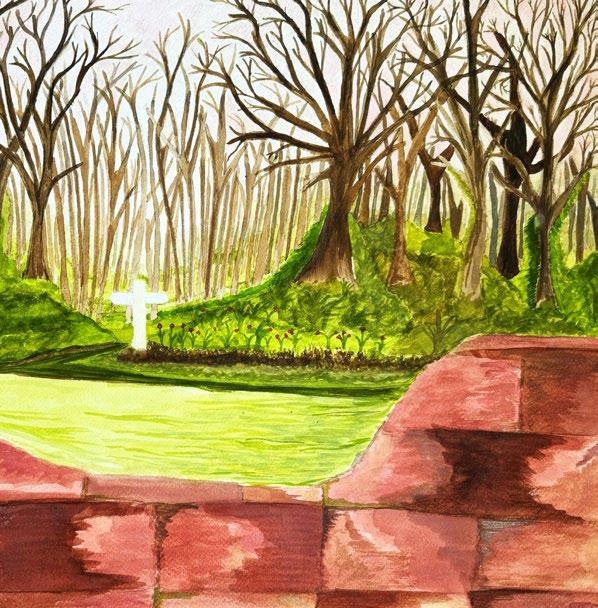
I rip it Up.
Black and white shreds. I don’t feel like A Hero. A Hero doesn’t take innocent lives. I feel sick, rush to the sink, fall over a toy and curse under my breath, mistake the heat in me for pain when it is in fact something else.
Vietnam took a lot. But I never thought it would take my children.
I feel a pain in my leg, and don’t try to get up. I don’t struggle, grapple, try to move. I lie there. Bathe in the dust and dirt shed from Such Familiar Skin. My wife. My children.
My family who never understood why I couldn’t go outside. That those we kicked out now live by our side. That we have rebuilt ourselves to accommodate refugees that we helped create. And I’m meant to stay.
Take it like Praise.
War exploded my life like the lives I bombed to bits.
It’s quiet. Too quiet. And I think I can hear a bird sing.
Vietnam took a lot. I’m not sure it will ever be rebuilt.
The sun shines. The sky clear. And I think of his voice I can never unhear.
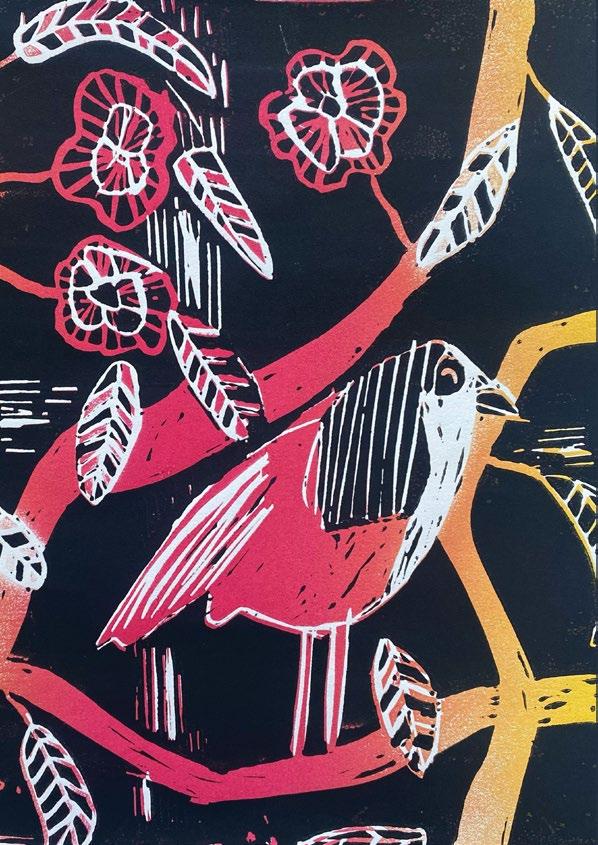
WRITERS’ ROOM - JUST WRITE
‘Just Write’ is an activity where writers are given a stimulus and then a limited timeframe to craft a creative piece based on the given stimulus. The stimulus for these pieces were: Artificial and Rust. Contributors: Jasper de Linde, Mayank Kalra, Harry Ng, Ryan McAleese, Isaac Crowhurst

The waves have their white foaming crests, bird wings form sweeping arcs. They stand like half spans of a bridge. The veins of every feather stand neatly by each other, like soldiers on a parade ground. She can almost hear the wind that whips through the older ones, splitting them. The man and his dog both gaze out, out to the column of clouds, fine, brooding with a visible grimace, and to those further out, mere splotches. An all-piercing beam cuts into the darkness, she can almost feel the glare, her eyes almost adjust when turning from the looming clouds to the light. Small scratches and withering stain the tower.
She peers closer at the frame.
Dreams aren’t real, they are artificial, intangible, abstract manipulations of reality. Perceptions of truths witnessed through a kaleidoscope of fantasy, escapism, and colour. That’s what they told us when they tried to extract them, that it was for some foreign study on our psychology; that everything they showed us in these dreams was fake. But the screams sounded real, they pierced and ricocheted in your ears like the bullet which caused them, and the warm blood splattering on sweaty palms felt real. And when I woke up, I didn’t forget any of it, like I would in a dream, the memories still vivid in my reeling mind, and under my left sleeve there was still one singular fleck of that dried blood…
The stench of putrid flames wafted towards me. Buildings rumbled, crumbling to dust and debris before my very eyes.
It wasn’t real.
It couldn’t be real.
I could feel my body trembling, shivering in anticipation.
It was just a simulation. It had to be.
Steeling myself, I exhaled softly, taking a tentative step into the wreckage. It was part of the standard procedure of the company to test your mental fortitude before admitting you into the fold. They had to be sure that you had what it takes to brave the horrors of war through a series of tests.
But ne’er had I expected this. I couldn’t say I was shocked at their crudeness; they had extracted my brain data for research purposes, they had said. What they conveniently omitted to mention was that they would have me reexperience my most traumatic memory as a testing method.
I sighed.
Nowhere to go but forward.
This wasn’t necessarily what I expected paradise to be, but they said it’s just as good.
It’s strange, because those “medical professionals” suggest that you should probably only take one pill at a time. If you ingest any more medicine than your dosage, please contact your general practitioner immediately. Perhaps I should have read the label.
It never quite fit. Always too snug, or too loose; never just right. A feeling that it was still there, but reality would not accept its existence, let it materialise. It felt like an added extra, something that was attached rather than joined.
The memory clung on, bringing back the loss as if it had happened again. The pain was raw, numbing the connection between what remained, and what was.
It will always be there, but it will always not.
My head began to clear almost immediately, all the fog and rust began to dissipate. Disorder became order, memories cleaned up, the filing cabinet of the mind finally tidied itself. Things were correct, but not natural.
Artwork: ‘Artificial’
By Ruaan Vamadevan
The disaster here left every building devoid of life. We contained the fires, mourned the dead, cordoned off the area and said never again. The landscape here, a potent reminder of the hubris of man.
Here, there was life once. Here, there were the laughs of children on a sweet summer morning, the song of the nightingale, but now, we merely hear the whisper of leaves in the breeze. The buildings had, by this point, been overgrown and overrun, the reactor still scarred from the flames that raced through its very heart, the playground crumbling under its own weight as the rust took it’s hold.
The city falls silent outside their window. The traffic is quiet in the day, now these streets are a graveyard. The black and white moquette provides a drizzle of light. The desk in front of them is instead flooded by a bleaching modern LED. They wield a plate-sized glass dish, its form inflating whatever artefact they place beneath it. A crisp click emanates from the clasp of the smooth walnut box that has stored the most basic of tools for years. They pull out their weapons against the rust, dirt, dust, and grime of all description. With the white gloves they turn and disassemble the watch. With decisive strokes they flick away the dusk then scratch out the rust.

Will a human rust if they stay still too long? Suffocated by the moulded walls of a decaying house, would they be frozen in time? Would ivy grow over dirtied bottles and smoke still billow out from a tarnished chimney? Would weeds slowly carpet wooden stairs, steel bedposts corrode, the radio still rock with muffled sound? Eventually, will flowers begin to emerge from the peeling wallpaper, would grass bed the sofa and animals burrow in the basement, bringing life once more to this long desolate house. Or would the sink just continue to drip,
Renewing the ruins, Wiping of the rust.
The renewal of the faithful, The rebirth of the robust. They furnish and polish, Remove all the dust.
Till it gleams brand-new, To reform, re-adjust.
And so, it emerges, it glimmers, it roars. The beast has returned, the monarch of war. The relic of the forgotten, bygone age, Its jewelled eyes shined and sparkled with rage.
Would people come back in five…ten…fifteen… years to see the renowned rusted house and if they did, would the dripping sink still be there, the dog still be there, I still be there? The rusted man.
